Is Studying a PhD in Computer Science a Crazy Idea? Pros and Cons

Are you considering a PhD (Doctor of Philosophy) in Computer Science but feel pretty unsure whether it's the right thing to do?
Gather round cos I've recently been weighing up this decision myself!
I don't mind getting stuck into books and studying, I also love the University experience.
So, it's got to be a rewarding experience! And should help further my career.
The answer turned out a bit more nuanced than that!
I know that as I've spent hours trawling the web for opinions, experiences and advice on sites like Quora and Reddit. This article is a summary of that work, listing every pro and con I could find.

1. What are the Pros of studying a PhD?
There are a few career paths facilitated by studying a PhD
- Academic research
- Commercial research (think having a role Google's DeepMind)
- Teaching at the college/university level. [3]
I haven't listed software development as a PhD is definitely not required to become a coder.
A bachelor's degree in Computer Science or Software Engineering is the requirement for most companies. Either of those degrees will give you the foundation necessary to understand programming at a deeper level and prepare you for a career in industry.
A PhD is mainly about research and opens up a host of advance and research-oriented opportunities. [2] The primary requirement to earn a PhD is that you must create new knowledge about your subject. . [5] [4] Even as a Professor, research may still feature high in your tasks.
There are, however, an increasing number of PhD jobs required in computer science such as research scientist for many of the top tech companies, where you would cover many of the same duties as during your PhD but on their commercial behalf. [3]
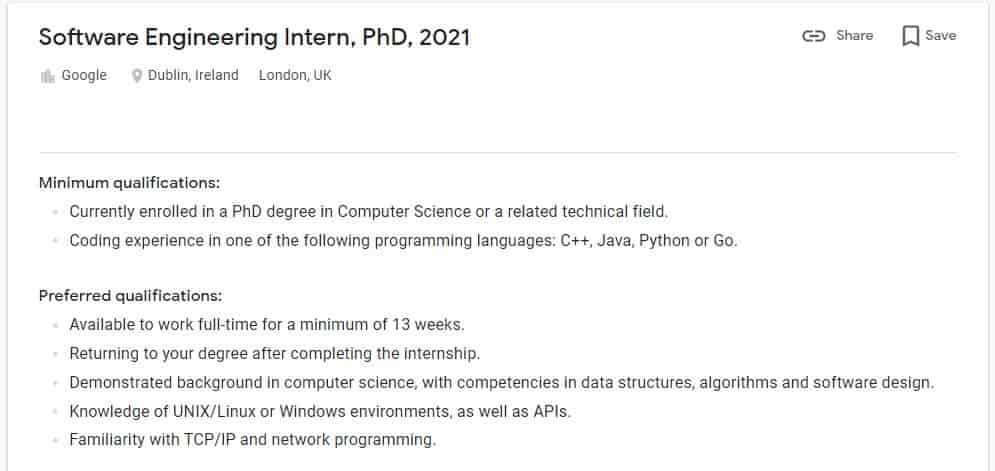
Even if you pursue a role as a coder, having a research focused background as a developer can help set you apart and bring new strengths and perspectives to a development team.
A PhD encourages you to take a more holistic approach to project solving. [3]
I like this quote I found from a developer:
"_Having said that and having been working in (effectively) an industry developer job for the past five years, what I've found is that my training has prepared me very well to ask questions at a higher level of abstraction, to recognize and plug gaps in our knowledge, and to think a bit beyond the highly focused build this now mentality that often drives development. _" [3]
During a PhD, you master teaching yourself how to learn, how to write well, and how to methodically solve problems. [3]
Additionally, many come into a Computer Science PhD from different fields and actually learn to code on the course. Switching to Computer Science at PhD level, where you solve problems with practical skills and technology, may ultimately benefit your career as compared to staying on your current trajectory.
1.3 It's Interesting
You've got free access to the latest/classified research, top class library services and access to leading professors in their field.
1.4 Prestige
Pulling off some high level and published research may bring you notoriety, eventually allowing to become recognized as a famous Professors/Researcher such as Canadian computer scientist Yoshua Bengio. [6]
1.5 Networking
You will undoubtedly meet some inspirational and well-connected people from all over the world.
Often those pursuing a PhD are among the most intelligent and educated of society. The crème de la crème of their perspective countries. Networking with them, and building friendships, will open a host of new career and travel opportunities.
1.6 It's Fun
Universities are a highly concentrated spaces of dynamic and energetic people.
You've got societies to pursue your hobbies and interests, parties and the good old university bar. Not to mention, subsidized gyms, food and often, accomodation.
Some of us, myself included, thrive in such as environment.
1.7 Self-fulfilment
A PhD will help feed an intellectual curiosity.
Do you like to inquire, invent, create, explore, read, discuss, ponder, teach and discover the unknown?
Compared with the rigid tasks of a normal job, a PhD let's you pioneer research, sketch out solutions to the unknown and share all of that with the world through academic publishing.
If you're the type of person who doesn't want to merely make things but understand why things work, a PhD might be for you.
2. What are the Cons that come with studying a PhD?
2.1 narrows your focus.
During a PhD you study a subset of Computer Science and although you become an expert in that area, you may lose touch with the broader understanding of the field.
For example, being super knowledgeable about, say, Convolutional Neural Networks (CNN) while knowing little to nothing about Recurrent Neural Networks (RNNs) or even more basic ML models (e.g. Logistic Regression) will reduce your overall employability to a very specific number of jobs. [1]
Unless you attain a scholarship, there is a hidden cost to PhDs that's notwithstanding the fees.
Those with a bachelor's or master's degree pursuing an industry role will be able to earn well, save and invest for the future.
PhDs are, therefore, incredibly expensive because your stipend is low compared to industry salaries and you are losing out of several years of salary reasonably early in your working life.
If you take into account compound interest, these few years will be worth the most when you retire. If you get average 8% return on investment, every $100k now earnt is $1M when you are 60. [7]
You can probably get a higher salary after getting a PhD, but chances are, if you continued working for 4-5 years, you would be getting similar salary as well.
You need to consider whether the non-monetary rewards of a PhD are worth that hidden cost.
The 5 or more years of your life exchanged for a PhD are, for most people, among your most productive, fruitful, healthy, and responsibility-free years of life.
Some people prefer to use that time climbing the career ladder, renovating a home, spending time with relatives or starting a business.
Attaining a PhD is a grind where constant and long-term deadlines are a stress that hangs over you.
2.4 Supervisor
During your PhD, you will generally be monitored by a supervisor.
Something I've seen come up a lot is that many students experience a bad relationship with their supervisor or feel that they're being steered in a direction contrary to their interests.
Studying a PhD doesn't equate to free reign. Be prepared to compromise and answer to a someone else, much in the same way in the real world.
2.5 Isn't Needed For Majority of Industry Roles
As rightly discussed in the pros, certain research career opportunities arise when studying a PhD.
However, for the majority of software roles, everything you can do with a PhD you can also do with a BSc or MSc. You might even be considered over-qualified for some jobs.
PhD students are also more likely perform worse on technical interviews than non-PhDs as they're often out of practice with coding (being so focused on research). Or, if they do code, it's in a more obscure language. [7]
With or without a PhD, you have to answer the same questions when interviewing in the industry: what can you do, what have you done, what skills and qualities make you the best candidate and the best fit?
Top tech companies judge you based on your interview performance, not your resume.
You may aspire to a faculty role, working as a professor, however, industry roles are often more numerous, more generously compensated, and provide a better work-life balance.
Research roles may also require you to move yourself and your family to wherever tenure beckons.
This point is contested but in some specialties of Computer Science, the research in industrial settings is arguably more relevant and more interesting, think of the research that Google and Facebook conduct in their own R&D departments.
2.6 A PhD is Antiquated
The concept of a PhD precedes the online education revolution of recent times, driven by technology and the limitless amount of information and tools available to us.
Nowadays, you can get PhD equivalent knowledge and skills in many fields just by learning on your own without costly time, energy, and career sacrifices using online courses (Code Academy, Coursera, edX, MIT OpenCourseWare , Udemy, etc.) [1]
Additionally, you are not limited in any way to keep up with trends, connect with leaders in the field, go to conferences, and immerse yourself in the field. Many industry practitioners indeed do.
2.7 It's hard
Doing a PhD will be completely different to your day job.
You probably find the technical side of your job pretty easy most of the time but your PhD should genuinely challenge you (if it doesn't, you've chosen too easy a project).
But there is also the psychological aspect of a 5+ year project that will sometimes feel like it's going nowhere. Although your supervisor will guide you, they won't give you the answers on a plate. It can be lonely. [1]
If you do not have the skills to learn on your own, nor motivation, curiosity, and discipline to manage your learning process, you're going to find it incredibly difficult and without a guarantee you'll actually graduate.
3. How to decide whether to pursue a PhD?
With all this taken into account, how do you come to a conclusion?
The most important question to start with is: "Can you do what you want to do without a PhD?"
Note, that you can't skip this question by saying, "Well, I don't know what I want to do." In that case, you need to figure it out before returning to the PhD question.
Also consider that for any given goal, getting a PhD will almost always be the "hardest way" to accomplish it. But for a select few number of goals, getting a PhD is also the only way to accomplish it, and therefore by definition also the easiest way.
For example, see yourself a 'professor and best-selling in a top academic institution' - then a PhD and the experience of one could be for you.
There are also two additional considerations _
Do you have a family to take care of, and can you do so just as well while working on a PhD? If you are currently raising a family, paying a mortgage on a home, and trying to send your kids to the best schools, then I would think long and hard before starting a PhD. A PhD is likely to substantially decrease both your time and money, two resources you need a lot of when you have a family.
If you don't currently have a family, mortgage, car, etc. doing a PhD may push certain life goals quite a bit further down the road.
Where are you planning to get your PhD from, and who will be your advisor? The institution you choose to do your PhD matters a lot more than where you did your undergrad. You really need to find a department that has the right reputation for your research interests.
My advice is, in order of priority:
- Do what you enjoy and will make you happy
- Do what will help you achieve your long-term goals
- Recognize that "success" means different things to different people
- Do not follow a path to satisfy someone else's aspirations
- Ensure it's the right time and that you can afford it
Basically, it's this - Pursue a PhD because you really, really want to explore and push the boundaries and you think it that will directly benefit your long term aims.
But, walk into it with the realization that it is very hard to get a job in academia (there are many more PhD grads than there are openings) and you may wind up back in the industry - the same place you would have been before, but years earlier.
Remember! You do not NEED a PhD. So it's OK to apply, see who admits you, and then decide if you really want to go or not. You should not decide to do a PhD, apply and then simply go to the best place that accepts you without proper consideration of all the points in this article. That's a recipe for misery! [1]
[1] https://quora.com/Am-I-crazy-to-leave-a-six-figure-salary-to-get-a-PhD-in-computer-science
[2] https://web.cs.dartmouth.edu/undergraduate/graduate-school-advice
[3] https://www.quora.com/Why-would-anyone-get-a-PhD-in-computer-science
[4] https://www.quora.com/Why-did-you-do-your-PhD-in-Computer-Science
[5] https://www.quora.com/Is-it-worth-it-to-get-a-PhD-in-computer-science-I-dont-want-to-become-a-teacher-at-a-university-I-want-to-get-a-job
About the Author

Hello there, my name is Joe aka "JD" aka "Scribbio", and you've landed on my side hobby! I enjoy writing articles that help individuals launch new careers in tech.
When I am not blogging, I work as a Software Engineering Bootcamp Educator and consultant specialising in the .NET framework and web technologies.
I coded CreativelyCode from scratch and am working hard to make it the best resource possible for our users. You can learn more about this site on the About page .
If you'd like to submit your own article or have any questions at all, please contact me on LinkedIn.
Is a PhD in Computer Science Worth It? [2024 Guide]
Is a PhD in computer science worth it? If you want the opportunity to engage in in-depth study of computing topics, conduct original research, and prepare for a job in the field of technology, then a doctoral degree in computer science may be the right fit for you.

Editorial Listing ShortCode:
Computer science experts use research and theories to fuel practical technology developments that make life safer and easier. If that idea intrigues you, then it may be time to enroll in a traditional or online computer science PhD program .
Is a PhD in Computer Science Worth It?

Yes, a PhD in computer science is worth it for many students. The Bureau of Labor Statistics is projecting 5% job growth in computer and information technology occupations over the next 10 years.
Common computer science careers in this field include:
- Computer and information research scientist
- Postsecondary teacher
- Software developer
- Computer and information systems manager
- Computer network architect
Technology is a continually growing industry. Working in this ever-evolving sector can be exciting, and earning a PhD may give you even more opportunities to explore (and even make) cutting-edge developments in the field.
Databases, software programs, and hardware systems can work together to solve real-world problems. The work that you do may offer solutions to serious issues in fields like medicine, education, and agriculture.
With a doctoral degree, you may qualify for top leadership roles at technology companies and other organizations. Your advanced online computer science degree may even earn you a title like chief technology officer or chief information officer.
A PhD is also usually the best path for those who want to enter academia, filling roles like researcher or professor.
Joining the faculty of a college may give you opportunities to teach others who will go on to make important contributions to the field of computers and technology, and to conduct original research yourself.
How to Decide Whether a PhD in Computer Science is Right for You

Pursuing a doctoral degree involves a commitment of time, money, and brainpower, so it’s important to make sure that it is the right path for you. To decide whether you should return to school for a PhD in computer science, keep in mind your interests and your career goals.
A doctorate in computer science may be right for you if you can relate to some or all of the following:
1. You want to make a lasting contribution to the field of computer science.
PhD programs often focus heavily on research. Not only may you learn about the latest research developments in this field, but you may also receive training on conducting your own scientific studies.
The research and experiments you do may help you invent future technology, write new programming languages, or develop advanced computing theories. Getting a doctorate can help you build a foundation for your scientific endeavors.
2. There’s a particular area of computer science that fascinates you.

In a bachelor’s or master’s degree program, you may have received broad overviews of the computer science field. While you may have enrolled in a specialization track, your program likely covered a large variety of topics.
A PhD program may be your opportunity to really narrow your focus in the field of computer science. You may build your dissertation project around one specific computing topic of your choice and spend years studying it.
3. You have your sights set on a career in academia.
Universities typically want their faculty members to hold doctoral degrees. Particularly if you want to obtain a full-time tenured position, you’ll likely need to earn a PhD first.
Working at a university may allow you to influence up-and-coming leaders in computing. You may also be given opportunities to perform research and involve students as your assistants, and have access to grants to fund your studies.
4. You want to be a corporate leader.

Companies need technology professionals. In corporate settings, the most senior positions (such as IT director or chief technology officer) may be available only to candidates with doctorates.
These may be some of the company’s highest-paying jobs. With a doctoral degree, you may also be in a position to start your own company, and take its leadership into your own hands.
5 Things You Can Do with a PhD in Computer Science Degree
There are a variety of jobs that someone with a PhD in computer science might take on. You may spend your days as a researcher or a university faculty member, or find employment in a corporate setting.
Here are just a few of the careers that someone with a doctorate in computer science might pursue:
1. Computer and Information Research Scientist

As a researcher, you may investigate ways to solve problems through computing or robotics. Your work may center around artificial intelligence, programming languages, cloud computing, or hardware components. Research scientists often collaborate with experts from a variety of disciplines.
Together, you may tackle issues in healthcare, manufacturing, technology, education, business, and other fields. Many research positions are with the federal government. Tech companies and universities also hire computer researchers.
2. Computer and Information Systems Manager

As a professional who is in charge of an organization’s computer-related responsibilities, you may hold a title like IT manager, chief information officer, or cybersecurity director.
As a computer manager, you may have the final word on all issues related to your organization’s computers and networks. Because this is a management position, you may coordinate team members, head up departmental budgets, oversee projects, and negotiate contracts.
3. Computer Network Architect

As a computer network architect, you may plan and build communication systems for computers. Network engineer is another common name for this job.
In this role, you might also be responsible for making system repairs or upgrades. Your extensive knowledge of computers can help you build networks that are as effective and efficient as possible.
Industries like technology, education, insurance, and telecommunications depend on computer network architects.
4. Postsecondary Teacher in Computer Science

College professors pass on their computer knowledge to students. As a faculty member, you may teach undergraduate or graduate students.
You may also head up research projects with the assistance of students. There may be associated responsibilities, such as applying for grants or publishing your findings. Some professors are full-time employees who can obtain tenure. Others teach part time, sometimes holding another job outside the university setting as well.
5. Software Developer

If you have a creative mind that enjoys thinking up new software programs and bringing them to fruition, then you might be interested in being a software developer. Software developers may design individual applications or full-fledged operating systems.
Some software developers work for computer companies. Others are hired by businesses to design proprietary software for particular tasks. Industries that commonly need software developers include insurance and manufacturing.
PhD in Computer Science Degree Alternatives

Although a PhD in computer science might be your first choice for doctoral studies, it’s worth exploring whether there might be a different program that better suits your needs.
- Doctor of Computer Science. This professional doctorate may suit those who want to work in business rather than academia. You may study topics like algorithms and cybersecurity, and may write a dissertation.
- PhD in Informatics. In an informatics program, you may study methods of making data accessible and beneficial. Informatics is often associated with healthcare, but also has applications in art, design, and language.
- PhD in Software Engineering. If building software systems is where your passion lies, then you may find success in a software engineering program. Your work may improve the safety and efficiency of programs.
To determine which of these programs is best for you, you may want to compare curricula and program outcomes.
Computer Science Careers & Salaries
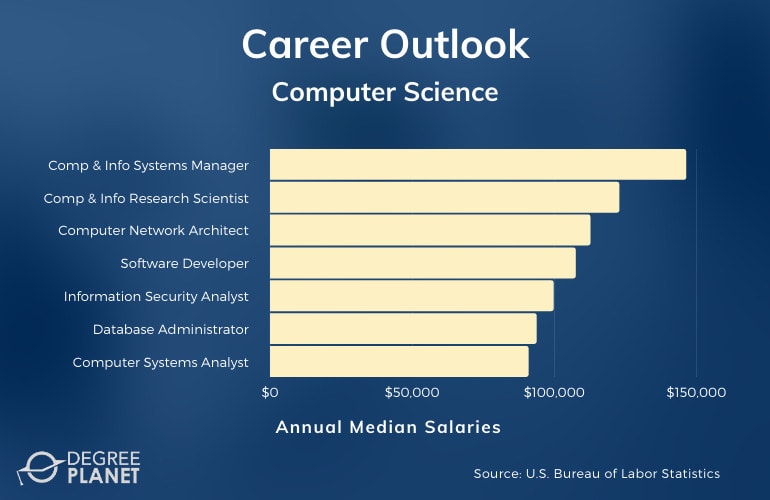
According to the Bureau of Labor Statistics , the average job in computers and technology pays a median salary of $91,250 per year.
Here are a few of the common jobs that someone with a PhD in computer science might pursue, along with their median annual salaries:
These figures reflect median salaries for employees across all levels of education. This means that some of these occupations may only require a bachelor’s degree. However, a graduate degree like a PhD or master’s in computer science is valuable to many students and may allow you to earn even more with a doctoral degree. Pay can also vary widely based on factors like experience and geographic region.
Getting Your PhD in Computer Science Degree Online

Becoming a computer science expert means that you may spend your career on the cutting edge of technological developments. This field offers the potential for high salaries and exciting growth opportunities.
With a PhD in computer science, you might become a researcher, a professor, or an industry leader. Jobs with colleges, government agencies, and corporations are widely available, with more being added every year.
For an education that can help open the door to many different career paths, take a look at the PhD in Computer Science programs that many accredited universities have to offer.

Explore your training options in 10 minutes Get Started
- Graduate Stories
- Partner Spotlights
- Bootcamp Prep
- Bootcamp Admissions
- University Bootcamps
- Coding Tools
- Software Engineering
- Web Development
Data Science
- Tech Guides
- Tech Resources
- Career Advice
- Online Learning
- Internships
- Apprenticeships
- Tech Salaries
- Associate Degree
- Bachelor's Degree
- Master's Degree
- University Admissions
- Best Schools
- Certifications
- Bootcamp Financing
- Higher Ed Financing
- Scholarships
- Financial Aid
- Best Coding Bootcamps
- Best Online Bootcamps
- Best Web Design Bootcamps
- Best Data Science Bootcamps
- Best Technology Sales Bootcamps
- Best Data Analytics Bootcamps
- Best Cybersecurity Bootcamps
- Best Digital Marketing Bootcamps
- Los Angeles
- San Francisco
- Browse All Locations
- Digital Marketing
- Machine Learning
- See All Subjects
- Bootcamps 101
- Full-Stack Development
- Career Changes
- View all Career Discussions
- Mobile App Development
- Cybersecurity
- Product Management
- UX/UI Design
- What is a Coding Bootcamp?
- Are Coding Bootcamps Worth It?
- How to Choose a Coding Bootcamp
- Best Online Coding Bootcamps and Courses
- Best Free Bootcamps and Coding Training
- Coding Bootcamp vs. Community College
- Coding Bootcamp vs. Self-Learning
- Bootcamps vs. Certifications: Compared
- What Is a Coding Bootcamp Job Guarantee?
- How to Pay for Coding Bootcamp
- Ultimate Guide to Coding Bootcamp Loans
- Best Coding Bootcamp Scholarships and Grants
- Education Stipends for Coding Bootcamps
- Get Your Coding Bootcamp Sponsored by Your Employer
- GI Bill and Coding Bootcamps
- Tech Intevriews
- Our Enterprise Solution
- Connect With Us
- Publication
- Reskill America
- Partner With Us
- Resource Center
- Bachelor’s Degree
- Master’s Degree
Best Doctorates in Computer Science: Top PhD Programs, Career Paths, and Salaries
Getting a PhD in the field of computer science is the best way to influence the future of technological innovation and research. If you are interested in getting a computer science doctoral degree, then our list of the best PhDs in Computer Science will help you find the program that caters most to your goals.
A PhD in Computer Science can branch out into a wide variety of science and tech fields. Be it information assurance, computational science theory, or cyber operations, you can specialize your computer science PhD to suit your interests. In our guide, we’ve also gone into detail about the average PhD in Computer Science salary and the best computer science jobs PhD students can get.
Find your bootcamp match
What is a phd in computer science.
A PhD in Computer Science is a doctoral degree where graduate students perform research and submit original dissertations covering advanced computing systems topics. Computer science is a broad field that covers artificial intelligence, operating systems, software engineering, and data science.
Your doctoral dissertation will include a research proposal, coursework in advanced topics related to computer science, and a thesis presentation. The wide span of this field allows you to choose a PhD program that can cover topics in any high-performance computing systems area.
How to Get Into a Computer Science PhD Program: Admission Requirements
The admissions requirements to get into a computer science PhD program include submitting your official transcripts from your undergraduate or graduate programs and resume. Your previous university coursework should showcase a strong background in software development, popular programming languages , and scientific computing.
Universities also usually require the submission of your GRE score. A combined score of 1,100 is typically where you want to be when applying to PhD programs. You’ll also usually be required to submit three or more letters of recommendation and a personal essay stating your thesis or research proposal. Keep in mind that each university’s admissions requirements will vary.
PhD in Computer Science Admission Requirements
- 3.0 or higher cumulative GPA
- Three letters of recommendation
- Official transcript from your undergraduate degree or your graduate degree
- Prerequisite courses covering computer science academic programs
- Personal statement highlighting proposal of thesis or research topic
Computer Science PhD Acceptance Rates: How Hard Is It to Get Into a PhD Program in Computer Science?
It is very hard to get into a PhD program in computer science. This is because prospective students need to meet a very competitive GPA, have an excellent academic background, and fulfill other advanced program requirements. Your chances of getting accepted into a computer science doctorate degree program will typically range between 10 to 20 percent.
In fact, less than 10 percent of computer science graduate applicants are accepted at the University of California. Similarly, Duke University reports that only around 15.7 percent of applicants were selected for its 2021 to 2022 computer science PhD program. Your acceptance relies on submitting a compelling thesis proposal statement that displays your passion and high academic competency.
How to Get Into the Best Universities
[query_class_embed] how-to-get-into-*school
Best PhDs in Computer Science: In Brief
Best universities for computer science phds: where to get a phd in computer science.
The best universities for computer science PhDs are Arizona State University, Boston University, Harvard University, Duke University, and Carnegie Mellon University. Each of these universities will help you advance your research and eventually get you a job in artificial intelligence , software development, or computing systems. We’ve also broken down the application process and other details for each program.
According to the US News & World Report, Arizona State University ranks number one on the list of the most innovative schools and number 36 in the best undergraduate engineering programs. It was founded in 1885 and currently offers over 450 graduate programs and employs more than 340 PhD fellows.
PhD in Computer Science
Arizona State University offers research opportunities in the fields of artificial intelligence, cyber security, big data, or statistical modeling under the umbrella of this computer science program. In this 84-credit program, you’ll tackle your dissertation, prospectus, and oral and written exams. You’ll also take courses on computational processes, information assurance, and network architecture.
Your PhD dissertation includes 12 credit hours of experience culmination that can be planned alongside your research and elective credits. This degree is best suited for computer scientists wanting to build a career in machine learning or an academic career.
PhD in Computer Science Overview
- Program Length: 4 to 6 years
- Acceptance Rate: N/A
- Tuition and Fees: $6,007/semester, nine credits or more (in state); $1,663/hour, under 12 credits or $16,328 per semester, 12 credits or more (out of state)
- PhD Funding Opportunities: Teaching assistantships, research assistantships
- Three letters of recommendations from former professors or employers
- One to two-page statement of purpose that covers previous research experiences and reasoning behind your interest in one to two doctoral programs
- Optional submission of GRE scores. Preferred scores are 146 verbal, 159 quantitative, and 4.0 analytical writing
- Official transcripts
- Bachelor’s Degree in Computer Science or computer engineering. Applicants with a master’s degree in a relevant field are preferred
- Minimum 3.5 cumulative GPA
Founded in 1839, Boston University is a top private research university with a reputable engineering and technology program. It offers over 350 graduate programs and PhDs in topics such as neurobiology, biostatistics, computer engineering, mathematical finance, and systems engineering.
PhD in Computer Science
If you are interested in advancing in research and academia, then this PhD program is worth looking into. Its curriculum trains you to build a successful professional background in the intelligent control systems, cloud infrastructures, and cryptography fields. Candidates need to clear its qualification, dissertation, and milestone requirements to complete this degree.
- Program Length: 5 to 6 years
- Acceptance Rate: 10%
- Tuition and Fees: $61,924/year
- PhD Funding Opportunities: Computer Science Fellowship, Teaching Excellence Award, Research Excellence Award, Teaching Fellow Expectations
- GRE scores normally mandatory, but are optional for fall 2022
- A personal statement stating your interest in the program
- Resume
Carnegie Mellon University is a globally recognized university with more than 14,500 students and over 109,900 alumni. The school was founded in the year 1900 and offers over 80 majors and minors. According to the US News & World Report, Carnegie Mellon University ranks number one on the best undergraduate computer science program in the country.
This on-campus PhD program focuses on computing research, software informatics, and communication technologies. Completing this doctoral degree program will open you up to a wide range of career prospects across the data science, computing technology, and information technology research fields.
This degree includes 24 units of advanced computing research, 72 units of graduate courses, and the dissertation process of an original research thesis. This PhD is apt for those looking to establish their career in research and academia. During this program, you’ll also serve as a teaching assistant in the computer science department twice as per the degree requirement.
- Acceptance Rate: 5% to 10%
- Tuition and Fees: $75,272/year
- PhD Funding Opportunities: Internal funding, external funding, dependency allowance, fellowships
- GRE scores optional but encouraged
- Most recent transcript of the university attended
- One to two-page statement of purpose stating your interest in the program, research interests, PhD objective, and relevant experience
- Three letters of recommendation from previous faculty or employers
Duke University was established in 1924 and counts among the top universities in the world. It has an undergraduate population of 6,789 and a graduate population of 9,991 students and is most recognized for its computer science, biology, public policy, and economics departments. It offers over 80 doctoral and master’s degrees covering STEM, social sciences, and humanities.
This computer science PhD is definitely worth it for doctorate students looking to embark on an advanced computer science research path. In it, students tackle a research initiation project, preliminary exam, dissertation process, and core qualification credits. Doctoral candidates are also required to partake in the department’s teaching assistantship program.
Its curriculum includes core courses in computation theory, artificial intelligence, algorithms, numerical analysis, and computer architecture. Graduates of the program open themselves up to numerous career opportunities across a wide range of computing systems academic and research fields.
- Program Length: 3 to 4 years
- Acceptance Rate: 15.7%
- Tuition and Fees: $70,185/year for the first three years and $18,165/year each subsequent year
- PhD Funding Opportunities: Teaching assistantships, research assistantships, fellowships
- Official transcripts from all attended universities
- Statement of purpose
- GRE scores are optional for 2022 but recommended
- No minimum GPA requirements but high GPA scores are preferred
Harvard University is a top Ivy League institution that has amassed global recognition and top rankings in many of its departments. Founded in 1636, the university is home to many excellent programs across the fields of law, medicine, economics, and computer science. It has more than 400,000 alumni and a total enrollment of 35,276 students.
According to the US News & World Report, Harvard University ranked number one among the best global universities in 2022 . Its graduate schools offer doctorate programs in the applied sciences, biology, literature, environmental sciences, business, and healthcare fields.
Attending a computer science PhD program at Harvard University brings high credibility and accolades to your professional candidacy. This program is offered by the university’s Graduate School of Arts and Sciences and provides focus opportunities across the engineering science, applied physics, computer science, and applied mathematics areas.
Similar to most mainstream PhDs, this program requires the completion of 10 semester-long graduate courses, a dissertation topic, oral and written qualifying exams, a teaching assistantship, and a defense process. After graduating, you’ll easily qualify for some of the most prestigious research and career opportunities available.
- Program Length: 3 or more years
- Acceptance Rate: 6%
- Tuition and Fees: $50,928 for the first two years and $13,240 reduced tuition for the third and fourth year
- PhD Funding Opportunities: Teaching fellowships, research assistantships, GSAS fellowships, external funding
- Supplemental form for PhD
- Transcripts from all post-secondary education
- Statement of purpose stating your interest in the program
Oregon State University is a public research university founded in 1868 with over 210,000 alumni. The school is home to more than 28,607 undergraduate and 5,833 graduate students and offers over 300 academic programs as well as a robust research department. Its doctoral programs can be found in the business, agricultural science, education, engineering, or medicine departments.

"Career Karma entered my life when I needed it most and quickly helped me match with a bootcamp. Two months after graduating, I found my dream job that aligned with my values and goals in life!"
Venus, Software Engineer at Rockbot
This PhD is offered by the university’s electrical engineering and computer science department and is perfect for doctoral candidates wanting to work in IT research in the governmental or educational sectors. The program offers research opportunities in topics such as data science, cyber security, artificial intelligence, computer graphics, and human-computer interaction.
The program’s curriculum includes graduate-level courses in theoretical computer science and requires the completion of your research thesis. You’ll also be required to maintain an overall cumulative GPA of 3.0 and pass all preliminary and oral exams to receive your PhD.
- Program Length: 4 years
- Tuition and Fees: $557/credit (in state); $1,105/credit (out of state)
- PhD Funding Opportunities: Graduate teaching assistantship, research assistantship, Outstanding Scholars Program
- Three letters of recommendation from previous professors or employers familiar with your technical skills
- Transcripts and academic history of all attended universities
- Minimum 3.0 GPA in the last two years of your undergraduate or graduate work
- Statement of objective listing your interest in the program, career goals, research interests, and relevant experience
Syracuse University is a private institution that was established in 1870 and is most popular for its research and professional training academic programs. It has more than 40 research centers focusing on the STEM, social sciences, and humanities fields. The university has over 400 majors, minors, and advanced degrees its students can choose from.
It had a total enrollment of 14,479 undergraduate students and 6,193 graduate students in the fall of 2020. Prospective students can pick a PhD focus from many of its applied topics, including data science, statistics, human development, and bioengineering.
PhD in Computer and Information Science and Engineering
A PhD focused in computer and information science and engineering from Syracuse University can help you advance your career in the information technology, software engineering, or information assurance fields. This program is best suited for computing technology research buffs looking to land senior-level positions in the field.
The program’s curriculum is an amalgamation of graduate coursework, your dissertation and research presentation, and exams. Your coursework will cover technical topics ranging from algorithms and artificial intelligence to operating systems and hardware systems.
PhD in Computer and Information Science and Engineering Overview
- Program Length: 4 to 5 years
- Acceptance Rate: 14.28%
- Tuition and Fees: $32,110/year
- PhD Funding Opportunities: Research assistantships, departmental teaching assistantships, university fellowships
PhD in Computer and Information Science and Engineering Admission Requirements
- Minimum GRE scores: Verbal 153, Quantitative 155, and analytical writing 4.5
- Bachelor of Science or Master of Science in computer engineering, electrical engineering, or computer and information science
- Two or more letters of recommendation from previous faculty or employers
- Official transcripts of all attended universities
- 500-word personal statement concerning your interest in the program
The University of Oklahoma is a public school best known for its business, journalism, and petroleum engineering programs. Founded in 1890, it currently has an undergraduate student population of 21,844 and offers over 170 academic programs and graduate degrees in a wide range of subject areas.
The school’s doctoral topics are numerous and can be found within its business, architecture, fine arts, education, engineering, journalism, or geographics science departments. The University of Oklahoma is also incredibly well known for its athletic programs, having won many national championships.
The university’s computer science PhD has courses in machine learning, data science, computer security, visual analytics, database management, and neural networking subjects. If you’re interested in a data science, network security, artificial intelligence, or cyber security career, then this PhD is for you.
The program allows you to propose a research topic covering anything in the field of advanced computing systems and theories. During your program, you’ll undergo an annual research progress review along with general examinations until your defense. The program also requires you to submit a minimum of two publications before you complete your degree.
- Program Length: 6 years
- Tuition and Fees: $591.90/credit (in state); $1,219.50/credit (out of state)
- PhD Funding Opportunities: Graduate assistantships, research assistantships, fellowships, scholarships, research grants
- Prerequisite coursework covering computer science, data structures, and math subjects
- Bachelor’s degree or master’s degree
- Minimum cumulative 3.0 GPA
- 250-word statement of purpose concerning your interest and goals in the program
- Three letters of recommendation, with two of them preferably from previous professors
The University of Arizona was founded in 1885 and is a public research institution with over 300 major programs. The school is home to 36,503 undergraduate and 10,429 graduate students and offers PhD programs in over 150 areas of study, including information science, statistics, mechanical engineering, biomedical science, medicine, communication, and economics.
If you want to become an applications architect or pursue a career in academia focusing on computing or business intelligence technologies, then this PhD is for you. It offers courses in computer networking, system architecture, database systems, machine learning theory, natural processing language, and computer vision.
The program’s curriculum requires the completion of 12 units of advanced computer science research and 18 units of dissertation presentation and defense. You’ll also need to maintain a minimum cumulative GPA of 3.33 to receive your PhD.
- Program Length: 5.5 years
- Acceptance Rate: 17.73%
- Tuition and Fees: $989.12/unit (in state); $1,918.12/unit (out of state)
- PhD Funding Opportunities: Graduate assistantships, graduate associate fund, teaching assistantships, research assistantships, graduate college fellowship
- Official transcripts from all attended universities
- Minimum of two letters of recommendation by previous faculty or employers
- A statement of purpose stating your interest in the school and the program faculty, your career goals, preferred research areas, and research background
- Resume detailing previous research work, published papers, conference presentations, and computer science background
- Bachelor’s degree in computer science or a related field
- A background in operating systems, programming languages, discrete mathematics, data structures, and theory of computation
- Minimum 3.5 undergraduate GPA and 3.7 graduate GPA
The University of Maryland is a research-focused institution that was founded in 1856. It hosts more than 41,200 students and offers over 217 undergraduate and master’s programs. It also offers 84 doctoral programs and has an extensive research department. According to the US News & World Report, the school ranks number 20 among the top public schools in the country .
This PhD program offers research opportunities in subjects such as robotics, big data, scientific computing, machine learning, geographic information systems, and quantum computing. Doctoral students can participate in a collaborative research journey at any of the school’s research specialized institutions. The program curriculum includes graduate coursework, a research proposal, and a dissertation defense.
- Tuition and Fees: $11,586/year (in state); $24,718/year (out of state) 2022-2023
- PhD Funding Opportunities: Research assistantships, departmental teaching assistantships, National Science Foundation Graduate Fellowships, Fulbright Fellowships
- Transcripts from all attended universities
- Writing sample and optional publications or presentations
- Statement of purpose concerning your interests in the field and program
- Three letters of recommendation
Can You Get a PhD in Computer Science Online?
Yes, you can get a PhD in Computer Science online. An online doctoral degree will be more course-based instead of research-based due to the lack of laboratory facilities. Computer science is a broad field that offers doctoral opportunities across a wide range of tech topics. You can get an online PhD in information science, data science, data analytics, or information systems.
Know that online PhDs are rare across most fields, including computer science. Obtaining a non-research-focused doctoral degree won’t be as respected as a traditional computer science PhD. The online PhD programs listed below are best suited for candidates looking to advance into managerial, theoretical research, and academic positions in the technology sector.
Best Online PhD Programs in Computer Science
How long does it take to get a phd in computer science.
It takes an average of four years to get a PhD in Computer Science. However, the actual duration is entirely dependent on the candidate’s research proposal approval and defense success, and depending on your research pace, it can take up to five or six years to complete. The graduate course portion of your degree is the most straightforward and typically takes around 2.5 years to complete.
Your dissertation topic selection, research journey, publication submissions, and defense presentations will take the most amount of time, usually between three to five years. Some universities also require their PhD students to complete a minimum of two years of graduate teaching assistantship. An online PhD in Computer Science usually only takes three years to finish, as it mostly includes advanced coursework.
Is a PhD in Computer Science Hard?
Yes, a PhD in Computer Science is hard. Computer science is a complex field that incorporates an array of advanced technical topics. Your PhD will require you to submit an original research proposal on an advanced information technology subject such as data science, machine learning, quantum computing, artificial intelligence, and network security topics.
Along with advanced research and a dissertation, you’ll also need to complete advanced graduate courses with a minimum GPA of 3.0. Other requirements often include submitting one or more publications, working in graduate teaching positions, and successfully defending your thesis topic. The combination of all of these academic requirements makes getting a PhD in Computer Science a hard process.
How Much Does It Cost to Get a PhD in Computer Science?
It costs $19,314 per year to get a PhD in Computer Science, according to the National Center for Education Statistics (NCES). However, your total PhD tuition can vary depending on a number of factors, including the university’s ranking, the program’s timeline, and the PhD funding opportunities you’ll have available.
The NCES further categorizes the graduate program tuition according to the institution type and reports that the average fee for public institutions was $12,171 from 2018 to 2019. It also states that private for-profit institutions charged an average of $27,776, and non-profit schools charged $14,208 those same years.
How to Pay for a PhD in Computer Science: PhD Funding Options
The PhD funding options that students can use to pay for a PhD in Computer Science include graduate research assistantships, teaching assistantships, and fellowship opportunities. Your funding options will vary from school to school and can include both external and internal funding.
Some of the popular ways to fund your PhDs include research grants, federal work-study programs, teaching or graduate assistantships, tuition waivers, and graduate research fellowships. You can also apply for scholarships or tuition reimbursement options at your current job. Your graduate advisor and computer science faculty can help you find more funding options.
Best Online Master’s Degrees
[query_class_embed] online-*subject-masters-degrees
What Is the Difference Between a Computer Science Master’s Degree and PhD?
The difference between a computer science master’s degree and a PhD is the level of each degree. A Master’s Degree in Computer Science is a typical precursor to a PhD and covers the technical field less extensively than a doctoral program. It will last around two to three years and can be fully course-based or thesis-based.
A PhD in Computer Science provides you with higher qualifications and more research and dissertation autonomy. It can last anywhere between four to six years and gives you original publication and research credibility. Both of these computer science degrees are considered graduate degrees, but a PhD provides you with a higher educational accolade.
Master’s vs PhD in Computer Science Job Outlook
The job outlook for a professional with a master’s vs PhD in Computer Science will generally coincide as most senior-level careers can be achieved with a master’s degree. According to the US Bureau of Labor Statistics (BLS), the job outlook for computer and information research scientists is projected to grow by 22 percent between 2020 and 2030.
This job typically requires a master’s degree meaning PhD holders also qualify and can apply for it. The commonality of these job growth statistics also applies to other tech positions, including information security scientists and network architects. That being said, the specific growth rate of your job will also vary depending on your career choice.
For example, university computer science professor positions, which typically only computer science PhD holders are eligible for, have a projected growth rate of 12 percent between 2020 and 2030, according to the BLS. With computer science professionals being high in demand, most PhD in Computer Science jobs have a positive projected growth rate.
Difference in Salary for Computer Science Master’s vs PhD
The difference in salary for computer science master’s vs PhD grads can vary depending on their position and place of employment. According to PayScale, the average salary for a computer science PhD holder is $131,000 per year , which is higher than the average salary of a master’s degree graduate.
According to PayScale, the average salary for a computer science master’s graduate is $105,000 per year . The salary disparity with these degrees stems from the differences in their level of seniority, industry experience, and educational accolades.
Related Computer Science Degrees
[query_class_embed] https://careerkarma.com/blog/computer-science-degree/ https://careerkarma.com/blog/degree-in-computer-science/ https://careerkarma.com/blog/computer-science-bachelors-degrees/
Why You Should Get a PhD in Computer Science
You should get a PhD in Computer Science because it is an advanced and highly reputable degree that will help you land senior technical, academic, and research roles. A PhD is a gateway to a lucrative and innovative technology career, allowing you to follow your research passion across the fields of artificial intelligence, data science, or computing theory.
Reasons for Getting a PhD in Computer Science
- Extensive and advanced research opportunities. A PhD in Computer Science covers many advanced computing science fields. You can learn specialized skills through your research opportunities and eventually work in advanced data science, artificial intelligence, neural networking, information technology, or computing theory.
- Higher salary. PhD graduates qualify for career opportunities working in senior positions as scientists, professors, managers, or heads of departments. These senior positions come with high compensation and job security.
- Rewarding education. A computer science PhD is perfect for those who are interested in contributing toward leading innovation and technology research. As a doctoral student, you can propose and conduct advanced research in the field while contributing to today’s technological growth.
- Increased job candidacy. Having a computer science PhD on your resume and portfolio will enhance your candidacy when applying to tech positions across all industries. A PhD is a highly reputable degree that demonstrates your expertise in the field and ultimately makes you a highly sought-after candidate.
Getting a PhD in Computer Science: Computer Science PhD Coursework

The graduate requirements for getting a PhD in Computer Science and most common PhD coursework are different from program to program and are heavily dependent on your specialization, but often have some commonalities. Here are some examples of courses you may take during your PhD.
System Architecture
A systems architecture course in a computer science PhD covers advanced operating systems, communication technologies, network security, and computer architecture. You’ll also take classes covering topics like network systems and software engineering.
Artificial Intelligence
Artificial intelligence is a rapidly growing field that is integral to the field of computer science and data science. Your program will cover the latest artificial intelligence technologies and research areas such as deep learning, interactive systems, neural networking, and artificial intelligence infrastructure.
Information Assurance
Network security, information assurance, and cyber security are also part of an extensive education coverage of the computer science field. This course will cover vital knowledge concerning information security, system integrity, data privacy, and system authentication.
Data science courses in a computer science PhD program cover topics such as big data, database management, data analytics, data mining, and machine learning subjects. You will learn about data science processes and methods as well as the tools and technologies used in advanced data engineering.
Theory of Computation
A theory of computation course will teach you advanced algorithms, computation models, Turing machines, quantum computing, and automata theories. You’ll also have lessons that cover the Godel Incompleteness theorem and molecular computing.
Best Master’s Degrees
[query_class_embed] *subject-masters-degrees
How to Get a PhD in Computer Science: Doctoral Program Requirements
If you are wondering how to get a PhD in Computer Science and complete the doctoral program requirements, this section will provide you with the answers you’re looking for. The graduation and academic requirements will vary from one PhD program to another, but there are some common requirements across all computer science departments. Here are some of them.
A computer science PhD is an amalgamation of graduate-level courses and research. All PhDs will require you to complete their graduate course requirements which cover topics like data science, computing systems, artificial intelligence, and information assurance. The required number of courses will vary depending on the program but is typically between 10 and 15.
Maintaining a minimum required cumulative GPA in your courses is a requirement across all PhD programs. The GPA requirement can range anywhere from 3.0 to 3.5. This is one of the major ways your program department tracks your progress and whether or not you are struggling with the work.
Clearing the qualifying exams with a passing grade while maintaining the required GPA is another PhD graduation requirement. Your preliminary exam is a public presentation discussing your research topics with approval committees and other students. Written exams and oral exams come with each course and are a test of your computer science and tech abilities.
You are typically required to present your research proposal or research initiation project within the first two years of your PhD. You must get your research idea approved by the approval committee and begin the research process within those two years.
Once you embark on your computer science research process, you are required to present an annual progress report. This presentation is a review process where the approval committee will ask questions and provide feedback on your progression.
Your PhD milestones may also include publication requirements. For these, you’ll be required to submit one or two peer-reviewed journal or publication entries covering the computer science topics you are researching.
Universities also require PhD candidates to complete two years of graduate teaching assistantships or research assistantships. These assistantships are one of the best ways to secure funding for your PhD program.
Getting your dissertation approved and completing your research and thesis is one of the most important milestones of your PhD. Your assigned research committee, thesis advisor, and approval committee will need to approve your research and dissertation for your to be able to graduate.
Computer science PhDs will have a timeline breakdown that candidates are expected to meet. You will typically need to complete the graduate coursework within two to three years and complete your dissertation and thesis within six years. You can request a timeline extension with your advisor’s approval.
The thesis for your PhD in Computer Science will cover your chosen research subject area. It will include a thesis proposal submission, thesis presentation, and thesis approval process as well as an extensive written document covering your hypothesis, findings, and conclusions.
Potential Careers With a Computer Science Degree
[query_class_embed] how-to-become-a-*profession
PhD in Computer Science Salary and Job Outlook
The salary and job outlook for a PhD in Computer Science will vary according to your job designation but are generally positive. The average salary for some of the highest-paid jobs will range between $86,712 and $179,351. Below are some of the most lucrative career paths a computer science PhD holder can embark on.
What Can You Do With a PhD in Computer Science?
You can work in a wide range of advanced technical positions with a PhD in Computer Science. This doctoral degree qualifies you for positions as a manager, scientist, college professor, and researcher. You could lead an information assurance department or become a computer science professor, chief data scientist, or artificial intelligence researcher.
Best Jobs with a PhD in Computer Science
- Computer Research Scientist
- Computer Science Professor
- Research and Development Lead
- Computer Systems Engineer
- Information Technology Manager
What Is the Average Salary for a PhD in Computer Science?
The average salary for someone with a PhD in Computer Science is $131,000 per year , according to PayScale. Your actual salary will vary depending on your specific position, location, and experience. In fact, with a PhD, you could work as a chief data scientist and make between $136,000 and $272,000 or as a senior software engineer and make $104,000 to $195,000.
Highest-Paying Computer Science Jobs for PhD Grads
Best computer science jobs with a doctorate.
The best computer science jobs with a doctorate degree all earn a high salary and have high projected growth in the next few years. These jobs cover a wide range of computer science disciplines, meaning that you’ll easily be able to find a position doing something you enjoy.
A chief data scientist is in charge of the data analytics and data science departments of an organization. They are responsible for the approval of new database system designs, data strategies, and data management decisions.
- Salary with a Computer Science PhD: $179,351
- Job Outlook: 22% job growth from 2020 to 2030
- Number of Jobs: 33,000
- Highest-Paying States: Oregon, Arizona, Texas, Massachusetts, Washington
A chief information officer is an IT executive responsible for managing and overseeing the computer and information technology departments of a company. Also known as CTOs, they are responsible for delegating tasks and approving innovation and technology upgrade ideas proposed by their teams.
- Salary with a Computer Science PhD: $168,680
- Job Outlook: 11% job growth from 2020 to 2030
- Number of Jobs: 482,000
- Highest-Paying States: New York, California, New Jersey, Washington, District of Columbia
A senior computer scientist heads the research department of a computer science, artificial intelligence, or computer engineering field. These professionals, along with their research team, are tasked with developing efficient and optimal computer solutions across a wide range of sectors.
- Salary with a Computer Science PhD: $153,972
An IT security architect is a cyber and information security professional responsible for developing, maintaining, and upgrading the IT and network security infrastructure of a business or organization. Additionally, they oversee an organization’s data, communication systems, and software systems security aspects.
- Salary with a Computer Science PhD: $128,414
- Job Outlook : 5% job growth from 2020 to 2030
- Number of Jobs: 165,200
- Highest-Paying States: New Jersey, Rhode Island, Delaware, Virginia, Marlyand
A computer science professor is a university professor who educates college students concerning basic and advanced computer science subjects. They are responsible for creating and instructing a course curriculum as well as testing their students. Some computer science professors also work as research faculty at a university.
- Salary with a Computer Science PhD: $86,712
- Job Outlook: 12% job growth from 2020 to 2030
- Number of Jobs: 1,276,900
- Highest-Paying States: California, Oregon, District of Columbia, New York, Massachusetts
Is a PhD in Computer Science Worth It?
Yes, a PhD in Computer Science is worth it for anyone wanting to work in senior professions in the field of technology. This doctoral degree opens its recipients up to numerous career opportunities across academia, research and development, technology management, and chief technical positions.
Getting a computer science PhD equips you with specialized skills and extensive research capabilities. During your studies, you’ll get the opportunity to contribute to the rapidly developing world of technology with your original dissertation and specialize in data science, network security, or computing systems.
Additional Reading About Computer Science
[query_class_embed] https://careerkarma.com/blog/what-is-computer-science/ https://careerkarma.com/blog/is-computer-science-hard/ https://careerkarma.com/blog/computer-science-career-paths/
PhD in Computer Science FAQ
The preferred GPA for a computer science PhD is 3.5 or above. Keep in mind that meeting the minimum requirement doesn’t guarantee acceptance. The higher you can get your GPA during your bachelor’s and master’s, the more likely it is you will be accepted to the PhD program of your choice.
The standardized exam you need to take to get a PhD in Computer Science is the Graduate Record Examination (GRE). The GRE score requirements will vary from university to university and several schools have currently waived GRE requirements due to the coronavirus pandemic.
You can choose from a wide range of potential research subjects for your computer science PhD, including computer algorithms, data science, artificial intelligence , or cyber security. You can also research business process modeling, robotics, quantum computing, machine learning, or other big data topics.
You can get into a computer science PhD program by impressing the admissions committee and the school’s computer science graduate department with your skills, experience, grades, and desired research topic. Students with a 3.5 or higher GPA, a high GRE score, extensive IT skills, and an impressive research topic have a higher chance of admission.
About us: Career Karma is a platform designed to help job seekers find, research, and connect with job training programs to advance their careers. Learn about the CK publication .
What's Next?
Get matched with top bootcamps
Ask a question to our community, take our careers quiz.

Leave a Reply Cancel reply
Your email address will not be published. Required fields are marked *

Doctorate in Computer Science Overview

Genevieve Carlton
Contributing Writer
Learn about our editorial process .
Updated January 4, 2024

thebestschools.org is an advertising-supported site. Featured or trusted partner programs and all school search, finder, or match results are for schools that compensate us. This compensation does not influence our school rankings, resource guides, or other editorially-independent information published on this site.
Are you ready to discover your college program?
Doctoral programs offer focused, advanced training in computer science subfields, opening the door to employment in academia and research.
A Ph.D. in computer science provides graduate-level training for leadership roles in tech, business, and academia. Computer scientists with doctorates can also work in software engineering , artificial intelligence, and data analytics.
A doctoral degree in computer science may not be the right path for everyone, but some high-level roles require a doctorate in the field. This guide provides an introduction to the expectations of computer science Ph.D. program, common doctoral concentrations, and the job outlook for individuals with doctorates in computer science.
What Is a Doctorate in Computer Science?
A Ph.D. is the highest degree in computer science . Doctoral students focus their training in particular specialty areas, conduct research with faculty advisors, and defend dissertations. Earning a doctorate in computer science takes 4-5 years. After completing their degrees, graduates commonly work in tech, biomedicine, business, and academia.
Computer science doctoral students strengthen their problem-solving, analytical, and research abilities. The degree requires exceptional computing and technology skills. Related programs with slightly different focus areas include computer engineering and computer information systems .
Who Should Pursue a Computer Science Ph.D.?
Doctoral programs require a significant commitment of time and effort. Most Ph.D. computer science programs take around five years, and some career paths, including academia, offer lower salaries than private sector jobs. Before applying to doctoral degrees, candidates should make sure their professional goals and personal attributes fit their prospective programs.
A Ph.D. in computer science trains graduate students for research-heavy and academic positions. Doctoral graduates can work as computer science professors, computer and information research scientists, and senior computer scientists.
Many tech careers do not require a Ph.D. in computer science. Consider other professional paths like computer engineering , web development , and software engineering .
What Are the Job Opportunities After a Ph.D. in Computer Science?
Computer and information technology jobs report faster-than-average projected job growth rates and significantly above-average median annual wages, according to data from the Bureau of Labor Statistics . In May 2020, tech jobs paid more than double the national median annual wage.
As a result, computer science careers offer a strong job outlook, and an advanced degree in computer science often yields greater responsibilities and higher earning potential. Professionals with Ph.D. degrees in computer science can move into academic, research, and leadership positions.
How Much Does a Ph.D. in Computer Science Make?
Computer science professionals earn a range of salaries depending on their career paths and industries. Doctoral degree-holders commonly work as computer and information research scientists, senior software engineers, computer science managers, chief technology officers, and computer science professors.
Professionals with Ph.D. degrees in computer science can earn median salaries between $85,000-$127,000 per year. The table below introduces common career paths, median salary data, and projected job growth.
Computer and Information Research Scientists
$126,830 Median Salary
15% Job Growth (2019-2029)
Source: BLS
Postsecondary Computer Science Teachers
$85,540 Median Salary
3% Job Growth (2019-2029)
— Is It Worth Getting a Ph.D. in Computer Science?
Computer science professionals with Ph.D. degrees earn high salaries and qualify for academic and research roles that either require or prefer a doctorate. When weighing whether a computer science Ph.D. makes sense, prospective students should consider whether their career goals require a doctorate.
Other factors to consider include opportunity cost, actual cost, and potential outcomes after completing a Ph.D. Is a Ph.D. in computer science worth it? The answer depends on each person's unique circumstances.
Financial Considerations of a Ph.D. in Computer Science
Earning a doctorate often means spending several years out of the workforce. Does it make financial sense for tech professionals to pursue Ph.D. degrees? A doctorate opens doors for high-paying careers as computer scientists, computer science professors, and chief technology officers.
Prospective students can lower the cost of their degree by applying for scholarships and researching fellowship and assistantship opportunities. An online Ph.D. program may offer greater flexibility for professionals who want to continue working while earning their degrees.
Admission Requirements for a Computer Science Ph.D.
Prospective Ph.D. computer science students must meet several admission requirements. At most universities, each candidate needs a minimum of a bachelor's degree in computer science or a related field. The most competitive programs may recommend a master's degree in computer science .
Each applicant typically submits their GRE scores, letters of recommendation, a resume, and a statement of purpose. International applicants generally need Test of English as a Foreign Language (TOEFL) or other English language proficiency exam scores. Because admission requirements vary by university, applicants should carefully review the process at each prospective school.
What Is Required for a Ph.D. in Computer Science?
- A bachelor's degree in computer science or a related field
- GRE test scores, though test scores are optional for some programs
- Letters of recommendation from former professors or supervisors
- TOEFL scores for international applicants
- A statement of purpose demonstrating drive and a clear career path
- The dedication to complete several years of doctoral-level computer science coursework
- A computer science concentration
- Passing scores on comprehensive exams
- The focus to complete dissertation research and write a dissertation
- Faculty committee approval at the dissertation defens
Which Country Is Best for Pursuing a Ph.D. in Computer Science?
Universities around the world offer Ph.D. in computer science programs. Where should prospective doctoral students earn their degrees? The answer depends on several factors, including location, career goals, and specialization.
Computer scientists interested in working internationally may benefit from earning degrees in the country where they plan to work, while American computer science programs may offer stronger domestic networking and career possibilities.
What to Expect in a Doctoral Program in Computer Science
Computer science Ph.D. programs prepare graduates for advanced roles. During their first year, Ph.D. students often complete required courses that provide in-depth knowledge of advanced computer science theories and applications.
Common graduate-level computer science courses cover computer systems, machine learning, databases, artificial intelligence, and data visualization. Some programs allow students to test out of core course requirements if they demonstrate graduate-level experience.
In addition to coursework, doctoral students must pass comprehensive examinations to demonstrate their mastery of computer science and move into the candidacy phase of their degrees. As doctoral candidates, they conduct dissertation research under faculty advisor supervision. A doctoral candidate completes their Ph.D. after defending their dissertation before a faculty committee.
Some programs also incorporate teaching experience or an internship. Graduate teaching assistants help professors with grading or leading discussion sections. A computer science internship builds real-world skills and helps doctoral candidates expand their professional networks.
How Long Is a Ph.D. in Computer Science?
A graduate student typically spends 4-5 years earning a Ph.D. in computer science. During that time, they complete coursework, pass comprehensive examinations, and conduct dissertation research. At the conclusion of the program, doctoral candidates defend their dissertations.
Most computer science programs operate full time, but many also offer part-time enrollment options. In a part-time program, students take a lower course load and may spend several additional years earning their degrees.
Computer Science Concentrations
During a computer science Ph.D., doctoral students choose concentrations to focus their studies. This specialization shapes their coursework requirements, choice of faculty advisor, and the material covered on comprehensive exams. In addition to the common computer science concentrations listed below, doctoral students can design custom concentrations based on their interests and career goals.
- Collapse All
Algorithmic Fairness and Data Privacy
Algorithms aggregate data about people's lives. In this concentration, doctoral candidates examine the intersection between algorithms as tools and the role of fairness and data privacy.
Artificial Intelligence
Enrollees in this focus explore deep learning, natural language processing, and machine learning. The concentration may include AI in robotics or data analytics coursework.
Computational Biology and Biomedical Informatics
A computational biology or biomedical informatics concentration uses computer science to improve medical outcomes, analyze biological data, and engineer medical technologies. This track requires a strong background in algorithms and machine learning.
Computer Architecture
Computer architecture explores the intersection between software and hardware systems. Doctoral candidates examine advanced theoretical approaches to computer and network architecture, including memory management and data output.
Computer Graphics, Animation, and Computational Physics
Computer animation relies on advanced knowledge of computational physics to simulate motion and model shapes. This concentration focuses on graphics and animation skills that require advanced computer science techniques.
Programming Languages and Logics
Computer science researchers develop new programming languages. In this concentration, doctoral students examine the structure and logic behind programming languages to improve existing languages or create new ones.
Software Systems
A software systems concentration prepares graduates for advanced positions in software development, including academia and applied roles. This track emphasizes software systems techniques and practical applications of computing systems.
Accreditation for Computer Science Programs
Prospective computer science Ph.D. students should research program and college accreditation when considering computer science degrees. Accredited colleges meet high standards for educating students and granting degrees. An accredited degree fulfills the requirements for professional licenses and certifications.
In addition to college accreditation, the top computer science programs hold accreditation from programmatic accrediting agencies. These agencies evaluate computer science programs on their faculty qualifications, student learning outcomes, and degree requirements. The Accreditation Board for Engineering and Technology grants accreditation to computer science programs.
Interview With an Expert

Dr. Siming Liu
Dr. Siming Liu is an assistant professor in the Department of Computer Science at Missouri State University . He obtained his Ph.D. in artificial intelligence in games at the University of Nevada, Reno in 2015. The focus of Dr. Liu's scientific curiosity is in computational intelligence, artificial intelligence, and machine learning, with applications in computer games and simulations. He is currently working on using reinforcement learning and evolutionary algorithms to build AI players for a variety of games (real-time strategy games, puzzle games, fighting games, racing games, sandbox games, etc).
Where did you get your Ph.D. in computer science?
I received my Ph.D. in computer science from the University of Nevada, Reno in 2015.
Why did you choose to study computer science?
When I was in middle school back in the early '90s, I was attracted to computers, where we could create virtual worlds and interact with the characters in these worlds through keyboard and mouse. I then decided to choose computer science as my major in college.
What did you specialize in?
I specialize in artificial intelligence, computational intelligence, machine learning, and optimizations.
What do you do for a career now?
I'm currently an assistant professor in the Department of Computer Science at Missouri State University. I work with graduate and undergraduate students on a variety of research projects in the field of constructing AI players to compete with human players and other AI players on different games and simulations. My long-term career goal is to be a successful researcher and educator at Missouri State.
What advice do you have for someone considering pursuing a Ph.D. in computer science?
For someone interested in a Ph.D. in computer science, I would say a Ph.D. can be extremely rewarding and a lot of fun, but it also means a great deal of dedication and hard work for a long duration. Unless you have a strong passion for the problems you are working on, you will not finish the Ph.D.
If you decide to apply to a Ph.D. program, I would recommend you to look into different universities and different Ph.D. advisors — their current research projects and their recent publications — before applying. Carefully review the Ph.D. advisors whose research topics interest you the most and contact them before you apply in order to introduce yourself and show your enthusiasm for the research.
Frequently Asked Questions
Is it worth getting a ph.d. in computer science.
A Ph.D. program can open new pathways and career advancement for roles in academia, research, and leadership. However, it depends on your career goals.
Professionals with computer science Ph.D. degrees earn above-average salaries. In 2020, computer and information research scientists reported a median salary of over $126,000 .
Each applicant needs a bachelor's or master's degree to gain admission to a Ph.D. program. Doctoral students must take courses, pass comprehensive exams, and defend dissertations.

Genevieve Carlton holds a Ph.D. in history from Northwestern University. After earning her doctorate in early modern European history, Carlton worked as an assistant professor of history at the University of Louisville, where she developed new courses on the history of science, Renaissance Italy, and the witch trials. Carlton has published five peer-reviewed articles in top presses and a monograph with the University of Chicago Press. She also earned tenure with a unanimous vote before relocating to Seattle. Learn more about Carlton's work at genevievecarlton.com .
Header Image Credit: FluxFactory | Getty Images
Learn more, do more.
More topic-relevant resources to expand your knowledge., popular with our students..
Highly informative resources to keep your education journey on track.
Take the next step toward your future with online learning.
Discover schools with the programs and courses you’re interested in, and start learning today.

Academic Degrees , Computer Science News
Why Get a PhD in Computer Science? Your Questions Answered
Updated: July 19, 2022
Published: August 24, 2019

Computer Science is an ever evolving and massively expanding field of study as technology continues to innovate and data grows exponentially. For those highly interested in research, earning your PhD in Computer Science can offer you top level accessibility to become an expert in the field and pursue either a high-level career within the industry or work in academia.
Most people who have completed the doctorate degree advise doing so only if you really love the subject and research. Earning your PhD in Computer Science has many benefits, although there is no doubt that it’s challenging.
Although a doctorate degree is not required to work in the field, it offers other benefits like allowing you to research cutting-edge technology with adequate funding. As with any graduate degree, it takes both time and money to complete, so before deciding to enroll, let’s go more in depth and answer some questions about why you would want to get a PhD in Computer Science.

Source: Unsplash
What is a phd in computer science.
A PhD in Computer Science is the highest level doctorate degree you can earn. Once you finish your undergraduate degree in Computer Science or a related field like Engineering or Applied Mathematics, you can apply for your doctorate degree .
If you didn’t major in Computer Science, then earning your Master’s degree in the subject will help you on your journey for your doctorate degree. Although it is not required to apply for a PhD, having your Master’s degree first is generally preferable.
Most programs require the following, along with a degree, to apply for a PhD:
- Previous research experience
- Letters of recommendation
- A high GPA (about 3.5-4.0)
Program Length
Earning your PhD in Computer Science is not for the faint of heart as it requires a lot of time, energy and perseverance. Although the length of completion depends on your enrollment status of full or part-time, it typically takes 5-6 years to finish.
Opportunities and Challenges
As the top academic achievement within the field, a PhD exposes students to high-level information, as well as some of the hardest challenges facing the world and technology. A PhD grants students the opportunity to perform the research of their choice and explore the topic that interest them the most.
Upon graduation, a PhD student can continue with academia or enter the industry. However, if you want to enter the field as a Computer Programmer, Software Developer or the like, you don’t have to earn a degree at this level as a Bachelor’s degree will suffice. In fact, some jobs may consider a PhD candidate to be too highly qualified, so you’ll want to assess your future goals before enrolling in a PhD program.
One of the benefits of earning this doctorate degree is the freedom you have. Most programs are quite unstructured, meaning that you get to choose what you want to research. Therefore, you can be a leading expert in the field and help to shape policies around artificial intelligence, automation and technologies that are changing the way the world functions.
The deep and rich education can expand your horizons and help you understand ideas and topics that you would never have otherwise considered.
Potential Jobs
Although it is possible to enter the field of Computer Science without a PhD, having the knowledge will expand possibilities and increase your pay.
Some of the job titles that PhD candidates seek include:
Computer and Information Research Scientist:
People in this position help to invent new programming languages that enhance business practices. With the high amount of data, information and research, these scientists can create changes and also assess their impact through analysis.
Database Administrator:
Database administrators organize and secure data against attacks. Those with a PhD can be trusted to understand the complex nature of various systems and be able to better protect them.
Software Developer:
Software developers create systems and software for various uses. Although a PhD is not required to be a software developer, it further enhances one’s understanding.
Computer Science salaries vary based on position type, location and education. However, the overall field of Computer Science is growing. In fact, Computer and Information Research Scientists are expecting much higher than average growth with the discipline expected to increase its demand by 19% between 2016 and 2026. Those with a PhD will increase their salary potential based on their educational accomplishment.
Furthermore, with a PhD in Computer Science, you can go on to be a professor since you’re a leading expert in the field. The demand for jobs within the field is growing, especially regarding cloud computing, data storage, artificial intelligence and information security.


Online Versus Traditional Programs
The reason you choose to earn your PhD in Computer Science is personal, and how you choose to do it is also a subjective choice. It’s hard to say if an online university or traditional onsite program is better or worse because the reasons for choosing to do one or the other are different.
The benefits of an online program include relatively lower costs, more flexibility and greater accessibility. However, an onsite program offers you more opportunity to perform research and work with those in person who are already advancing the field.
For example, some students who earn their Bachelor’s degree in Computer Science online from University of the People may enjoy the online experience and therefore want to continue their studies remotely by earning their PhD online as well.
Earning your undergraduate degree is the first step in moving towards earning your PhD in Computer Science. While the field is always growing and the opportunity for research multiplies, pursuing a PhD in the discipline is an important decision to make. The program generally offers freedom to select your area of interest, but it also takes time and a lot of dedication to complete.
Those who go on to get their PhD should really have an affinity for the subject matter and love to conduct research. It’s also useful to know that it’s typically easier to earn a PhD then enter the field as opposed to working in the field and then going back to earn your PhD.
Any form of higher education will never serve as a detriment as it helps expand your mind, create more networking opportunities and better hone your skills and knowledge regarding specific subject matter.
Related Articles
Online Doctorate in Computer Science

Online Computer Science Ph.D.: An Overview
Top schools with online computer science ph.d. programs, jobs for computer science ph.d. holders, prerequisites for an online computer science ph.d., online coursework.
- Data visualization.
- Machine learning.
- Database management systems.
- Advanced computer architecture.
- Information quality theory.
How long does a Ph.D. in computer science take to complete?
Cost and return on investment (roi), how much does a computer science ph.d. cost, how to estimate the return on investment (roi) of your degree, example courses.
- Artificial intelligence
- Algorithm design
- Analytics for big data
- Futuring and innovation
- Cybersecurity management
Job Outlook and Salaries for Graduates
Pay for online ph.d. in computer science degrees.

Online PhD in Computer Science Guide | Salary & Requirements 2024
Phd in computer science overview.
The field of computer science has seen exponential growth in the last decade as web-based apps and media platforms continue to grow. An online Doctor of Philosophy (PhD) degree in Computer Science prepares graduates for some of the highest-paying positions in the nation with technology firms of varying sizes.
As industries continue to adopt digital technologies, the demand for graduates with postsecondary degrees in the field of computer science remains steady. Businesses like Google and Microsoft continue to hire web developers, coders, and other computer science specialists to manage their web-based platforms/services.
What Is Computer Science?
As a computer science professional, your job is to:
- Observe, listen to, and communicate with clients
- Python, HTML, Java, C++ and more
- Offer strategies to ensure the functionality of web-based platforms
- Collaborate with UX specialists to ensure website functionality
Depending on the industry or client, computer science specialists may work in-house or be contracted externally.
What Can I Do With An Online PhD in Computer Science?
There are many viable career options for professionals with an online PhD in Computer Science. At tech corporations, start-ups, and in higher education, computer science professionals:
- Develop software
- Maintain data systems
- Teach students coding theory
- Complete programmatic updates
- Maintain server security
Professionals with an online PhD in Computer Science provide in-demand services that continue to increase in value as countless entities adopt web-based platforms for business and internal use.
Others who graduate with a PhD in Computer Science end up working in academia as a PhD satisfies minimum requirements for many colleges and universities.
PhD in Computer Science Salaries and Career Outlook
Graduates with a PhD in Computer Science may pursue careers as:
- College Professors
- Computer Science Specialists
- Database Managers
- Research & Development
Job growth in the computer science career field can vary depending on the position, and graduates should note that these statistics are reflections of the current job market that can fluctuate over time.
Computer Science PhD Career Paths
- Median Salary: $85,540
- Career Outlook: +7% (2020-2030)
Professors that teach computer science at the university level conduct courses in coding, software design, and database management.
- Median Salary: $126,830
- Career Outlook: +22% (2020-2030)
Professionals in this field to develop new software and improve on existing platforms to improve user experience and efficiency.
- Median Salary: $116,780
- Career Outlook: +5% (2020-2030)
Network architects help organizations manage their local-area networks and wide-area networks.
- Median Salary: $110,140
Software developers create computer programs/applications and work closely with UX specialists to provide iterative updates that address bugs/create efficiencies.
Source: BLS
Earning A PhD in Computer Science
An online PhD in Computer Science typically takes between 4-5 years to complete. It’s always smart to research in-person and online formats to find the program that fits your schedule.
Aspiring PhD students should consider admissions requirements, areas of specialization, and cost to ensure the program they choose fits their goals and lifestyle.
Pros And Cons Of PhD in Computer Science
Time, cost, and job placement are important factors to review when looking for a PhD program. Compared to a master’s degree in computer science, a PhD in Computer Science allows graduate students to gain access to higher-paying, upper-level positions in the tech and academic fields.
Due to the flexibility offered with an online program, doctoral students have the opportunity to complete their degree with sometimes little to no impact on their current day job.
Coursework In PhD in Computer Science Programs
Most classes included in computer science programs align with industry standards. Classes like Computer Languages, and Database Design, and Machine Learning provide students with a wide range of knowledge and skills to help them operate in a variety of roles post-graduation.
Courses often include topics like data management, robotics, artificial intelligence, and software development. As a prerequisite to many of these classes, general knowledge of computer science and hardware can help students prepare for PhD-level coursework.
Computer science graduate programs typically culminate in a research project.
Skills Learned In PhD in Computer Science
With a PhD in Computer Science, graduates enter the workforce with a wide range of industry-specific skills. These programs build skills such as:
- Writing and improving code
- Website generation
- Advanced software engineering
- Communication
- Troubleshooting
- Operational functionality
- Systems maintenance
How Long Does It Take To Get A PhD in Computer Science?
Some PhD programs take four years to complete, while others take up to five years. Most programs usually require 90 credit hours, including electives and the Teaching Assistantship requirement.
Factors that impact the length of a degree program include:
- Prior education (Master’s in Computer Science preferred)
- Accelerated course availability
- Synchronous vs asynchronous learning
- Part-time vs. full-time course loads
Choosing The Best PhD in Computer Science
There are many ways to earn a PhD in Computer Science. For example, you can choose to study online, in-person, or through a hybrid of both options. You may want to earn additional certifications and licenses, depending on your specialization or field of interest. This section explores the different options available for future computer science students.
Online vs In-Person Graduate Degrees
Potential computer science PhD applicants have options depending on their current schedule and employment status. Applicants should be aware that there are many online programs to choose from.
- Online learning offers flexibility, though on-campus learning can provide additional networking opportunities that may improve the job search post-graduation.
- On-campus, students learn interpersonal skills that benefit them in professional settings.
- If students choose to study online, this can be a great way to balance a job while completing the doctoral program.
There is no right option between the two, though most doctoral students likely prefer one option over the other.
10 Best Schools With Degrees in Computer Science
- Massachusetts Institute of Technology
- Brown University
- Cornell University
- Stanford University
- Carnegie Mellon University
- Dartmouth College
- Columbia University in the City of New York
- University of Pennsylvania
- University of California – Berkeley
- Duke University
If you’re looking for other schools that offer online degrees in computer science, check out the Find Your Perfect “U” tool. You can search over 6,000 colleges and universities with 11 different filters to find the perfect school for you !
How Long Does It Take To Complete An Online Course?
Depending on the type of online course, student experiences can vary. If courses are taught synchronously, then students must attend online lectures and labs at set times. Hybrid courses offer a combination of online lectures and in-person lab time, ideal for students looking to acquire skills needed to work post-graduation.
If a course is taught asynchronously, students can watch lectures and study with flexibility. Alternatively, certificate programs offer accelerated online courses that condense the subject matter into 3-6 week increments.
Licensure and Certification
Many computer science positions prefer and potentially require applicants to have a license and/or certification (especially for PhD grads). Prospective students should be sure to research their intended job prospects to ensure they acquire the appropriate credentials depending on the region and type of position they may hold.
Admissions Requirements
The first step to applying to any program is to check the admissions requirements to confirm the prerequisite experience needed to qualify. Most information technology programs require:
- Proof of completion of a 4-year bachelor’s degree from a regionally accredited institution
- Minimum GPA requirements – These vary depending on the program
- Official Transcript
- GRE test score
- Application fee
- Letter of Intent
- Letters of recommendation
It is always a good idea to submit applications to schools with varying rates of acceptance. You should also diversify your application list and include schools with high and low rates of admission.
Paying For A PhD in Computer Science
The cost of an online PhD in Computer Science varies depending on a range of factors. In-state tuition tends to be much cheaper than out-of-state, so be sure to apply to programs locally if cost is a determining factor.
Online programs can be more cost-effective and accessible than in-person programs, providing applicants with options depending on their prior obligations. Some online programs also extend in-state tuition rates to all students regardless of where they live.
Lastly, colleges, universities, and organizations offer scholarships that are merit or need-based that can help minimize the financial impact of going to school.
Scholarships
There are many scholarship options for students in the field of computer science. Here are a few:
- Generation Google Scholarship
- Richard E Merwin Student Scholarship
- IEEE Presidents Scholarship
Computer Science Career Resources
Online computer science phd faqs.
- Due to the web-based nature of the IT sector, pursuing an online PhD in Computer Science is a lucrative alternative to in-person education. Market projections for job growth and compensation are very positive.
- Professionals with a PhD in Computer Science can expect to make upwards of $80,000 post-graduation, with some roles grossing up to $200,000 annually.
- A PhD is a lengthy, intense, and challenging ordeal. Potential applicants should think about the time and financial commitment before applying to a program.
- After receiving a PhD in Computer Science, graduates can enter the workforce immediately at top tech firms, internally at fortune corporations, and in the academic field in a teaching capacity.
Get all the Universities.com's college news, advice, updates, financial aid, and more straight to your inbox.
- Payscale.com
- https://upe.acm.org/
- https://www.computer.org/
- https://www.bls.gov/ooh/computer-and-information-technology/home.htm
- https://cse.gatech.edu/academics/computer-science-phd-program
- https://www.cs.ubc.ca/students/grad/prospective-grads/grad-programs/phd-track-msc-program
25 Best Online PhD in Computer Science Degree Programs
Looking for Online PhD Computer Science programs for 2024? Compare schools & accelerated programs.

Pursuing a degree in computer science can help you become a leader in a cutting-edge field and develop skills that are in demand by top companies.
Editorial Listing ShortCode:
A PhD in computer science online may give you a distinct advantage over other job candidates and help you earn an average salary of between $73,000 and $146,000, according to the Bureau of Labor Statistics, depending on your career path.
Universities Offering Online PhD Computer Science Degree Programs
Methodology: The following school list is in alphabetical order. To be included, a college or university must be regionally accredited and offer degree programs online or in a hybrid format.
1. Auburn University
Auburn University is a public research university in Auburn, Alabama. It is the second-largest university in the state. It was founded in 1856 and was first called the East Alabama Male College. There are 15 colleges and over 140 majors that students can choose from. Auburn University is committed to preparing students for the modern global economy.
- Ph.D. – Computer Science and Software Engineering
Auburn University is accredited by the Southern Association of Colleges and Schools (SACS).
2. Boston University
Boston University, located in Boston, Massachusetts, is a private nonsectarian university. They have a vibrant, diverse, and welcoming community with over 35,000 students from 130 countries, over 10,000 faculty and staff. There are more than 300 programs of study in 17 colleges across three campuses.
Boston University looks beyond classroom boundaries by engaging with people, discussing relevant ideas and issues that impact the world.
- PhD in Computer Science
Boston University is accredited by the New England Commission of Higher Education.
3. Clarkson University
Clarkson University, founded in 1896, is a private research university with its main campus in Potsdam, New York. It has two branch campuses in Beacon, New York and in the New York Capital Region. It takes pride in having globally oriented faculty members who help learners pursue interdisciplinary research focused on solving real-world problems.
At Clarkson, student life is a unique mix of academics and extracurricular activities, allowing students to make lifelong connections in a tight-knit community.
- Computer Science PhD
Clarkson University is accredited by the Middle States Commission on Higher Education.
4. Colorado Technical University
Colorado Technical University, founded in 1965, was first named Colorado Technical College. In 1995, it gained its university status. The majority of its students take classes fully online.
CTU offers undergraduate, graduate, and doctoral degrees which focus primarily in business, management, and technology. They have a main campus in Colorado Springs and another campus in Denver. Most of their degree offerings can be completed entirely online.
- Doctor of Computer Science (DCS)
Colorado Technical University is regionally accredited by the Higher Learning Commission (HLC) of the North Central Association of Colleges and Schools (NCA).
5. Columbia University
Columbia University in the City of New York is a private Ivy League research university. It was established in 1754 on the grounds of Trinity Church in Manhattan. It is considered as the oldest institution of higher education in New York and the fifth-oldest institution of higher learning in the country.
It is home to a diverse and dynamic academic community consisting of more than 40,000 students, faculty, and staff from across the nation and different parts of the world.
- Computer Science Doctorate Degree
Columbia University is accredited by the Middle States Commission on Higher Education.
6. Dakota State University
Dakota State University was founded in 1881 as a school for teacher education. Over the years, it has shifted its primary focus to the cyber world, providing students with the technological knowledge and skills they need to excel in their chosen careers.
The university continues to grow at a fast pace, expanding its campus, and immersing in the most advanced and innovative technology.
- PhD in Cyber Operations
Dakota State is an institution accredited by the Higher Learning Commission (HLC).
7. Embry-Riddle Aeronautical University
Embry-Riddle Aeronautical University offers a wide variety of degree programs to meet the needs of learners in this changing world. A lot of exceptional achievements make Embry-Riddle stand out from the rest.
It is the first and only University in the nation to offer undergraduate Space Physics. It is also the first to offer programs in Spaceflight Operations, Unmanned and Autonomous Systems Engineering, Aerospace Physiology, and Security and Intelligence.
- Ph.D. in Electrical Engineering & Computer Science
Embry-Riddle Aeronautical University-Worldwide is accredited by the Southern Association of Colleges and Schools Commission on Colleges.
8. Johns Hopkins University
Johns Hopkins University was founded in 1876 and named after its first benefactor, John Hopkins, an American entrepreneur and philanthropist. It is a private research university located in Baltimore, Maryland.
The university aims to prepare students to become global leaders and citizens by giving them opportunities to take part in international learning activities, thus staying true to its mission of bringing the benefits of discovery to the world.
- Ph.D. in Computer Science
Johns Hopkins University is accredited by the Middle States Commission on Higher Education.
9. Michigan Technological University
Michigan Technological University, founded in 1885, is a public research university located in Houghton, Michigan. Its main campus nestles on 925 acres on a bluff overlooking the picturesque Portage Lake.
It is the first post-secondary institution in the Upper Peninsula of Michigan and was founded to train mining engineers to operate the local mines. Presently, Michigan Tech offers over 130 degree programs through its five colleges and schools.
Michigan Tech is accredited by The Higher Learning Commission (HLC).
10. Mississippi State University
Mississippi State University is a world-class comprehensive, doctoral degree-granting institution with a diverse student body comprising of students from different states in the country and from different nations in the world.
The Mississippi State community shares a common goal of making each learner’s experience a lifetime opportunity. It is located in the eastern part of north-central Mississippi.
Mississippi State University is accredited by the Southern Association of Colleges and Schools Commission on Colleges.
11. National University
National University is a network of nonprofit educational institutions headquartered in San Diego, CA. It offers many undergraduate, graduate, and certificate programs that can be completed online or at one of its campuses in California.
The network is dedicated to providing flexible, quality education that helps adults meet their goals.
- Computer Science PHD-TM
National is regionally accredited by the Western Association of Schools and Colleges.
12. Nova Southeastern University
Nova Southeastern University is a private nonprofit university with its main campus in Davie, Florida. It offers a wide variety of innovative programs that can be completed on campus or online. These programs are aimed at fostering academic excellence, leadership, research, and community service.
The university consists of 18 colleges and schools with more than 150 programs of study.
NSU is accredited by the Southern Association of Colleges and Schools Commission on Colleges (SACSCOC).
13. Pennsylvania State University
Pennsylvania State University is a public land-grant, doctoral university with campuses and facilities all over Pennsylvania. It was established in 1855 as the Farmers’ High School of Pennsylvania.
Penn State actively conducts teaching, research, and public service. It offers undergraduate, graduate, professional, and continuing education degree programs that can be completed on campus or online. Penn State has 19 other commonwealth campuses and 5 special mission campuses across the state.
Penn State is regionally accredited by the Middle States Association of Colleges and Schools.
14. Southern Methodist University
Southern Methodist University, founded in 1911, is a private research university located in University Park, Texas. It also has satellite campuses in Plano, Texas and Taos, New Mexico.
It is a distinguished center for global research with a strong foundation of liberal arts. Its dynamic and diverse community consists of students from 50 states and 90 countries who take advantage of small classes, hands-on research opportunities, international studies, and leadership development.
Southern Methodist University is accredited by the Southern Association of Colleges and Schools Commission on Colleges (SACSCOC).
15. Syracuse University
Syracuse University, founded in 1879, is a private research university located in Syracuse, New York. It is historically affiliated with the Methodist Episcopal Church in Lima, New York. The university is recognized as a student-focused global research university that takes pride in its academic rigor, richly diverse learning, and a commitment to discovery.
- Computer & Information Science & Engineering, PhD
Syracuse University is accredited by the Middle States Commission on Higher Education and many of our schools/colleges and programs are accredited by professional organizations.
16. University of Arkansas – Little Rock
Students in the Computer and Information Sciences Ph.D. program at University of Arkansas – Little Rock can choose tracks in either Information Quality or Information Science. While all courses in this program can be completed 100% online, there are three residency requirements for degree completion.
- PhD in Computer and Information Sciences
The University of Arkansas at Little Rock is accredited by the Higher Learning Commission.
17. University of California – Berkeley
The University of California-Berkeley, founded in 1868, is a public research university in Berkeley, California. It is the flagship campus of the University of California. It offers 350 undergraduate and graduate degree programs in various disciplines.
With over 35,000 students from different corners of the world, its vibrant campus community is dynamic and interconnected with hundreds of student organizations to connect with students’ passions.
- PhD in Electrical Engineering and Computer Sciences
UC Berkeley has been fully accredited since 1949 and had its accreditation reaffirmed most recently in 2015 under the Western Association of Schools & Colleges (WASC) pilot institutional review process.
18. University of Idaho
The University of Idaho, located in Moscow, Idaho, is a public, land-grant research university. It is Idaho Space Grant Consortium’s lead university.
Since its founding in 1889, the university has been providing its students with a transformative and high-quality education designed to prepare them to solve real-world problems and achieve their individual goals and endeavors in their lives and careers.
The University of Idaho is accredited by Northwest Commission on Colleges and Universities.
19. University of North Texas
The University of North Texas is a public research university located in Denton, Texas. It consists of 11 colleges, two schools, and an early admissions math and science academy for exceptionally gifted high-school-age students.
It is one of the country’s biggest universities and offers 105 undergraduate and 88 master’s and 37 doctoral degree programs. By working in collaboration with business and community partners, students can become better prepared to meet challenges in the real world.
- Ph.D. in Computer Science and Engineering
The University of North Texas is accredited by the Southern Association of Colleges and Schools Commission on Colleges.
20. University of Pennsylvania
The University of Pennsylvania has a long and proud tradition of academic excellence and a continuing pursuit of innovative knowledge. This tradition lives on today through the effort, dedication, creativity, and engagement of students, faculty, and staff.
The university traces its roots in 1740, with the initiative of George Whitefield, a prominent evangelist, to build a charity school in Philadelphia.
- Ph.D. in Computer and Information Science
The University of Pennsylvania is accredited by the Middle States Commission on Higher Education.
21. University of Rhode Island
The University of Rhode Island is a public, land grant and sea grant research university, with its main campus in Kingston, Rhode Island. As a leading research university, URI offers undergraduate and graduate courses that are defined by innovation and designed to meet the challenges of the modern world.
It has a diverse and dynamic student population with more than 18,000 students from 48 states and 76 countries.
The University of Rhode Island is accredited by the New England Commission of Higher Education (NECHE).
22. University of South Carolina
The University of South Carolina, a public research university, has a history of 200 years of academic leadership, and it continues to build on that tradition.
It is among the country’s oldest and most comprehensive public universities, with an enrollment of approximately 21,000 undergraduate students and around 8,000 students in graduate and professional programs. It has seven other branch campuses throughout the state.
- Doctor of Philosophy in Computer Science
The University of South Carolina was most recently accredited by the Southern Association of Colleges and Schools Commission on Colleges (SACSCOC) in 2011.
23. University of Southern California
The University of Southern California, established in 1880, is a private research university in Los Angeles, California. It is known as California’s oldest private research university and one of the world’s leading private research institutions.
USC is home to a diverse community of over 44,000 undergraduate and graduate students and 4,000 full-time faculty members.
The University of Southern California has been fully and continuously accredited by the Western Association of Schools and Colleges, the Senior College and University Commission (WSCUC).
24. University of Utah
The University of Utah, the state’s flagship university, is a public research university in Salt Lake City, Utah.
There are more than 100 undergraduate majors and over 92 graduate degree programs offered. It was founded in 1850 and was first called the University of Deseret. It changed to its current name in 1892, four years before Utah was declared a state.
The University of Utah has continuously maintained accreditation through the Northwest Commission on Colleges and Universities (NWCCU) since 1933.
25. Wright State University
Wright State University is a public research university, named in honor of the aviation pioneers, Orville and Wilbur Wright. It was founded in 1967 and its main campus is located in Fairborn, Ohio. It has an additional branch campus on Grand Lake St. Marys.
The university offers bachelor’s, master’s, and doctoral degrees with over 292 degree programs. Its mission is to transform the lives of students and the communities they serve.
Wright State University is accredited by the Higher Learning Commission (HLC).
Online PhD Computer Science Degree Courses

The first few years of your doctoral program will probably be dedicated largely to coursework. Class offerings can vary greatly among schools, and you’ll usually have a good deal of latitude to select topics that correlate to your area of interest.
There may be a few foundational classes that all computer science doctoral students are required to take. In addition, you may need to ensure that your course schedule includes at least one class from each required category; for example, you may need a theory class, a programming class and an applications class.
- Artificial Intelligence – your time in this class can help bring you up to speed on some of the latest advancements in artificial intelligence and give you an idea of the direction that this technology may be heading. You’ll likely discuss search algorithms and probabilistic models.
- Databases – this course explores advanced topics in creating and using databases. Data analytics will likely be an important component of your studies, and you’ll probably discuss query optimization and warehouse modeling.
- Graduate Algorithms – this course can help equip you with skills and tools for advanced data collection and analysis. The topics may include hash tables, linear programming, max-flow algorithms, and dynamic programming.
- Programming Languages – your earlier academic programs probably introduced you to the basics of using programming languages, and this doctoral course is designed to build on your object-oriented and functional programming skills. You’ll likely talk about applying algorithms and running optimizations.
- Project Management for Software Design – creating a new program or operating system can involve coordinating numerous people over a long span of time. This class covers how to provide organized leadership for the process and ensure that all involved parties stay on the same page.
- Research Methods – by teaching you how to conduct original research, this class can help you get ready for your dissertation process and your future career ambitions. You’ll likely discuss different research methods, be asked to consider how bias can affect results, and be expected to demonstrate your research skills.
- Teaching Methodologies – after completing your doctoral work, you may aspire to become a university faculty member. A teaching course can help you develop your instructional skills and may give you opportunities to lead classes.
Although you can probably select many of your own classes, there will be a set number of credits that you must earn. After completing your required coursework, you will probably need to take a qualifying exam. Passing this test is usually a prerequisite to beginning your dissertation process.
Careers in Computer Science for PhD Graduates
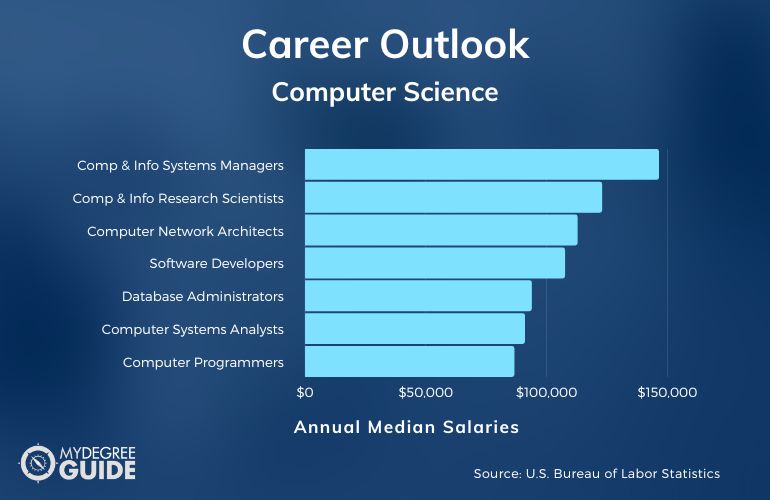
Your doctoral degree in computer science can help prepare you for jobs in tech companies, the business world, academia, or research.
Your advanced education may qualify you for leadership roles in which you direct teams of employees or spearhead tech innovations. The field of computer and information technology is growing, and the Bureau of Labor Statistics predicts that 531,200 new positions will be added for the next ten years.
The federal government is one of the largest employers of computer and information research scientists . Other potential employers include academic institutions and research organizations.
Software and computer companies also hire computer researchers. These professionals often work in urban centers, and the East Coast and the West Coast have some of the highest concentrations of computer scientists.
As you advance, this job has the potential to become quite lucrative; the top 10% of researchers in this field make over $189,780 each year.
Computer Science Professional Organizations

As a leader in computer science, you should continually strive to improve your professional abilities and to advance the field. Joining industry organizations can help you achieve those goals.
- Association for Computing Machinery – ACM is a worldwide organization that promotes networking, research, industry advocacy, and ethical conduct among members. The group maintains the ACM Digital Library.
- CompTIA Association of Information Technology Professionals – CompTIA offers certification programs, and those who qualify are automatically enrolled for membership in this support and advocacy group. Non-certified professionals and students are welcome to purchase a membership as well.
- Computing Research Association – Computer researchers from government, business and academic institutions collaborate through CRA.
- IEEE Computer Society – IEEE’s global network includes people who work in the engineering and technology fields. Societies allow members to join specialized subgroups.
Joining these organizations can provide opportunities to learn from others and to share your knowledge.
Accreditation for Online PhD Computer Science Programs

Any school that you choose for your PhD program should be accredited. As with your bachelor’s and online masters in computer science programs, the best type of accreditation to consider is regional accreditation. Employers are unlikely to hold a degree from an unaccredited school in high regard.
Regional accreditation is granted by organizations that are approved by the Council for Higher Education Accreditation and the U.S. Department of Education.
These groups include:
- Higher Learning Commission (HLC)
- Middle States Commission on Higher Education (MSCHE)
- New England Commission of Higher Education (NECHE)
- Northwest Commission on Colleges and Universities (NWCCU)
- Southern Association of Colleges and Schools Commission on Colleges (SACSCOC)
- WASC Senior College and University Commission (WSCUC)
The most important reason to choose a regionally accredited school is to ensure that your degree, whether earned online or on campus, is respectable. In addition, accredited programs are eligible for federal financial aid, and credits may be transferrable elsewhere.
Financial Aid for PhD Computer Science Students

Doctoral students often have access to multiple funding options. Some schools allow students to serve as research or teaching assistants, and they receive a stipend in return. You can ask your school’s financial aid department whether you will be eligible for an opportunity like this or other doctoral funding.
In addition, you can fill out the Free Application for Federal Student Aid (FAFSA) to find out what federal or state assistance, such as grants or loans, you can receive. You may also be able to get doctoral fellowships through your school’s computer science department or a private organization.

Is There a PhD in Computer Science?
Yes, computer science is a common PhD offering at many universities. Computer science doctoral candidates may perform research related to artificial intelligence, databases, information technology, programming languages, or algorithmic theory.
You may take courses like Deep Learning, Graduate Algorithms, and Semantic Information Processing. Earning this degree may allow you to advance fields like technology, medicine, education, or journalism through innovative computer developments.
Can You Get a PhD in Software Engineering?
Yes, a PhD in software engineering is an option at many schools. In such a program, you may explore human-computer interactions, data collection from software, and methods of software testing. Your studies may prepare you to work in software research and development or to teach software engineering at the undergraduate or graduate level.
How Long Does It Take to Get an Online PhD Computer Science Degree?

Students’ time in doctoral programs can vary, but you may be in school for three to eight years in either an on-campus or an online PhD in Computer Science program.
- Year One – to begin your studies, you’ll choose a research advisor and take your first classes.
- Year Two – next, you’ll probably form an advisory committee, finish your classes, and take qualifying exams.
- Year Three – after that, you may be ready to submit your application for PhD candidacy and begin your dissertation process.
- Remaining Years – the remainder of your time will likely be spent conducting and presenting research and writing and defending your dissertation.
It’s important to note that your timeline will vary depending on your dissertation requirement (or lack of it). While most PhDs do require a dissertation, a professional doctor program does not require a doctoral thesis or dissertation , but will often instead offer a capstone project option.
After completing these steps, you can apply for graduation from your program.
Some universities offer part time PhD in Computer Science programs, but these will of course take longer to complete than programs requiring full time attendance.
How Much Does a PhD in Computer Science Make?

Salaries for people with computer science doctorates can vary widely depending on their particular job or field of expertise, their experience, and where they live in the U.S. For example, corporate information systems managers, on average, earn nearly twice as much as professors.
According to the Bureau of Labor Statistics, among information systems managers , those who earn the least make less than $87,480 each year. The 10% with the highest wages bring in over $208,000 annually.
Average salaries are highest in California, New York, and Texas. Those who are employed by clothing retailers, financial establishments, and electronics manufacturers may bring in some of the top earnings.
Which University is Best for PhD in Computer Science?

Picking the best university for your doctoral program is a big decision compared to that of picking a university for, lets say, an online computer science associate degree . Rather, it’s a matter of finding the program that’s the best fit for your personal goals and interests.
You should look for a university that is accredited and where the faculty’s research interests line up with your own so that they’ll be qualified to spur you on toward a greater understanding of your chosen subject area. Additionally, you may want to look for faculty members who have professional connections to industry partners that intrigue you.
Finally, for schedule flexibility, consider schools with online programs.
Is an Online PhD Computer Science Degree Worth It?

Yes, an online PhD computer science degree is worth it for many students. The Bureau of Labor Statistics is projecting 11% job growth in computer and information technology occupations over the next 10 years. Common careers in this field include computer scientist, chief technology officer, information technology director, and web developer.
If you have aspirations of making a significant contribution to the world of computing, then you may want to pursue your PhD in computer science. This degree can help you become ready to lead teams, conduct research, and teach new generations of tech students. Your doctoral credentials may qualify you for greater respect and a higher salary.
Studying at one of the best online computer science colleges makes earning a doctorate doable for many working professionals. By balancing your professional and academic responsibilities, you can earn your degree without putting your life on hold. To get started, submit application materials to the online computer science PhD programs that most interest you.


- Majors & Careers
- Online Grad School
- Preparing For Grad School
- Student Life
Top 10 Best Online PhDs in Computer Science

If you have a passion for technology, a PhD in computer science online could be the key to the career of your dreams . But what if you don’t want to give up your existing job or sacrifice your personal commitments for the 4-7 years it takes to earn a doctorate? Online PhD computer science programs are the perfect solution, letting you study at your own pace and on your own schedule.
How do you pick out the top computer science PhD programs? Read on to discover the best universities offering online PhD computer science programs today.
Related: Best Master’s in Computer Science Programs
Table of Contents
Best Online PhD Computer Science Programs
Dakota state university.
Doctor of Philosophy in Information Systems

DSU is designated a center of excellence for advanced studies by The Department of Homeland Security and the National Security Agency. Its doctoral program in information systems prepares students for careers in research, education, or administration through qualitative design, quantitative research, theory, and practice in information science and software engineering.
- Specializations : Analytics, Security, Healthcare
- Duration : 3 to 7 years
- Credit hours: 72
- Tuition : $580.60 per credit hour
- Financial aid : Federal loan, work-study, and grants.
- Acceptance rate: 83.6%
- Location: Madison, South Dakota
Northcentral University
Doctor of Philosophy in Computer Science (PhD-CS)

Northcentral University is a non-profit university primarily founded to offer online programs in higher education to working professionals. Their programs don’t follow a cohort system, instead offering one-on-one coaching. Their PhD computer science online program equips students with advanced knowledge in state-of-the-art technologies such as Artificial Intelligence, Cybersecurity, and Data Mining.
- Credit hours: 60
- Duration: 40 months
- Tuition : $1,094 per credit
- Financial aid: Scholarships, loans, grants, and veteran benefits
- Acceptance rate: 90%
- Location : San Diego, California / Scottsdale, Arizona
Capella University
Doctor of Philosophy in Information Technology (General IT)

Capella University is a higher education institution that emphasizes competency-based education and works with consulting industry experts to design its curriculum. Its computer science PhD online program will help you gain advanced knowledge in IT practice and ethical leadership strategies. Out of all the online PhD programs in computer science on this list, this one offers unique courses about business research design.
You can choose an area of focus such as network architecture and design or IT security, or focus on technology within a particular industry for your dissertation. The program allows you to transfer up to a maximum of 12 credits.
- Courses : Information technology strategic planning, testing, measurements, business research design, qualitative design & analysis.
- Credits: 75
- Tuition: $965 per credit
- Financial aid : Scholarships, military benefits
- Acceptance rate : 100%
- Location: Minneapolis, Minnesota
Colorado Technical University
Doctor of Computer Science

Colorado Technical University is a non-profit institution that provides higher education options for students from all backgrounds using the possibilities of today’s advanced technologies and innovations. It has been awarded a range of honors and offers opportunities for lifelong learning. Its doctorate in computer science program is suitable for professionals working in the computer science industry, consultancy, and academia. You can choose between concentrations like Big Data Analytics and Cybersecurity & Information Assurance.
- Courses : Computer science & information systems, future innovation, and qualitative research methods.
- Credits : 100
- Duration : Minimum 3 years
- Tuition : $598 per credit hour
- Financial aid : Grants, scholarships, and military benefits
- Location: Colorado Springs, Colorado
Capitol Technical University
Doctor of Philosophy (Ph.D.) in Computer Science
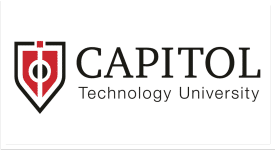
Capitol University provides industry-focused education in various technology fields through its academic and industry experts. The core courses in its PhD in computer science include computer science research methodologies, computer science future demands, and computer science doctoral writing.
- Credits : 60
- Duration : Minimum 2 years
- Tuition : $933 per credit
- Financial aid : Military discounts and student loans
- Acceptance rate : 84.4%
- Location : Laurel, Maryland
University of North Dakota
Online Computer Science Ph.D.
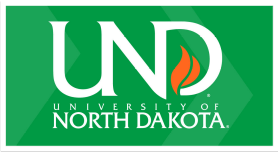
The University of North Dakota’s online programs have the same curriculum, faculty, and semesters as on-campus programs, and let you earn identical qualifications as its on-campus programs. Its online PhD in computer science includes many courses on the latest technology that help prepare students with practical experience to solve real-world issues.
- Courses : Data engineering and management, AI/computational intelligence, and computer forensics.
- Credits : 60 (90 for bachelor’s degree holders)
- Duration : 4 to 5 years
- Tuition : $798.08 per credit
- Acceptance rate : 86.8%
- Location : Grand Forks, North Dakota
The University of Arkansas at Little Rock
Ph.D. in Computer and Information Sciences

The University of Arkansas is a doctoral/research-intensive institution designated by the Carnegie Foundation and accredited by the Higher Learning Commission. Its PhD in Computer and Information Sciences is an interdisciplinary program covering subjects from diverse computing fields.
- Tracks : Information quality or information science
- Credit hours: 75
- Tuition: $383 per credit hour
- Financial aid: Graduate assistantships, loans, and scholarships
- Acceptance rate: 56%
- Location: Little Rock, Arkansas
Clarkson University
Ph.D. in Computer Science

Clarkson University is a small university with strong links to reputed industry organizations that boasts a 97% placement rate. Its PhD in computer science is an interdisciplinary program that is jointly offered by the Electrical & Computer Engineering and Computer Science departments. The curriculum includes theory, practice, seminars, and a thesis.
- Course : Theory & algorithms, languages & software development, applications, computer systems & networks
- Credit hours : 36
- Duration : Maximum 7 years
- Tuition : $1,533 per credit hour
- Financial aid : Scholarships, loans, and graduate assistantships
- Acceptance rate: 78%
- Location: Potsdam, New York
University of the Potomac
Doctor of Computer Science (DCS)

The University of the Potomac, previously known as Potomac College, offers various degrees in a range of sought-after disciplines, emphasizing technology in education. The university’s PhD program in computer science aims to help students develop their skills and become tomorrow’s leaders in research and development. You can transfer up to 36 credits out of the total of 60 in the program.
- Credits: 60
- Duration: 3 years minimum
- Tuition : $1,551 per 3 credits
- Financial aid : Loans, scholarships, grants, and federal work-study
- Acceptance rate: 100%
- Location: Washington, DC; Falls Church, Virginia; Chicago, Illinois
Atlantic International University, School of Science and Engineering
Doctor of Computer Science (D.Sc)

Atlantic International University’s online programs are based on the philosophy that learning is individual and so are designed with a high degree of flexibility to meet every student’s needs. Its PhD in computer science allows students to build on their knowledge in computing and broaden their research interests.
- Courses : Machine Learning, Artificial Intelligence, Advanced operating systems, Design & analysis of VLSI
- Tuition : $5,750
- Location : Honolulu, Hawaii
Online PhD Computer Science Requirements
The essential prerequisite for almost every PhD in computer science online is a master’s degree in computer science or a related field. Exact requirements vary between programs, but you’ll typically need to submit the following:
- Academic resume
- Letters of recommendation
- Academic transcripts
- A personal statement , research proposal, or both.
After gaining admission to the program, you’ll need to complete 3-7 years of studies. Usually, the coursework covers theory of advanced topics in computer science and associated disciplines. The final thing you’ll need to complete to earn your doctorate is a research-based dissertation.
How to Choose a Computer Science PhD Program
It can be difficult to choose between the best computer science PhD programs available today.
Here are a few key factors to keep in mind:
- Accreditation : Make sure the university or college is nationally or regionally accredited. This will mean that the program follows high standards and the certificate has value.
- Cost : Keep in mind that this may not only involve tuition, but also other fees.
- Curriculum : Consider the courses, specializations, and tracks offered.
- Career Prospects: Assess whether the program is geared toward career paths in research, academia, or practical roles, and how these match with your interests. Will the program allow you to meet your career objectives?
Related Reading: Top 10 Best PhD in Computer Science Programs
What Jobs Can You Get with a PhD in Computer Science?
With a PhD in computer science, you’ll be eligible for a range of senior-level roles in the sector.
Here are some of the most common jobs for individuals with a doctorate in computer science, with the annual median salary for each:
- Information Systems Manager ( $85,093 )
- Network Architect ( $122,110 )
- Database Administrator ( $74,488 )
- Professor, Computer Science ( $89,106 )
- IT Consultant ( $80,909 )
- IT Director ( $122,212 )
- Senior Project Manager, IT ( $116,497 )
- Vice President, IT ( $153,028 )
- Information Security Analyst ( $73,450 )
Related: Top 10 Highest Paying PhD Degrees in 2022
What is the Average Cost of a PhD in Computer Science?
The per-credit tuition can range from $450 to $1,000 , depending on the specific program. Therefore, the total program tuition could add up to $27,000 to $60,000.
It’s also important to factor in other study expenses in addition to tuition. Studying online will help you avoid accommodation and transportation fees, though you may need to pay a technology fee.
PhD in Computer Science FAQs
Can you get a phd in computer science online.
Yes, it is possible to earn a PhD in computer science online. Many universities offer online doctorate computer science programs. While some are 100% online, others require you to complete a minimal amount of face-to-face sessions to complete the program.
Is a PhD in Computer Science Worth It?
A PhD in computer science can be extremely valuable. The Bureau of Labor Statistics (BLS) projects that computer and IT occupations will grow by 13% from 2020 to 2030, higher than the average across all occupations. Moreover, the annual median salary is $97,430, more than double that of the average across all professions.
How Fast Can You Get a PhD in Computer Science?
The duration times vary depending on the program and whether you choose to study full or part-time. You can complete a PhD in computer science in as little as three years. Most programs will let you take up to seven years to gain your doctorate.
How Long Does it Take to Get a PhD in Computer Science?
Most students take 5-7 years to complete a PhD in computer science. However, you may be able to cut this down to 3-4 years, particularly if you can transfer credits from previous studies.
Final Thoughts
The field of computing and information technology offers a wide range of opportunities. With technology advancing at breakneck speeds, this sector needs increasing numbers of professionals with advanced qualifications in specialized computer science-related fields. Therefore, online PhD computer science programs can set you up for a lucrative and rewarding career at the highest levels of the industry.
Interested in expanding your dream PhD search beyond an online computer science PhD? Discover more excellent courses, both on-campus and online, with our guides to the best free online master’s courses , the best online PhDs in Psychology , and the best online engineering degrees .

Lisa Marlin
Lisa is a full-time writer specializing in career advice, further education, and personal development. She works from all over the world, and when not writing you'll find her hiking, practicing yoga, or enjoying a glass of Malbec.
- Lisa Marlin https://blog.thegradcafe.com/author/lisa-marlin/ 12 Best Laptops for Computer Science Students
- Lisa Marlin https://blog.thegradcafe.com/author/lisa-marlin/ ACBSP Vs AACSB: Which Business Program Accreditations is Better?
- Lisa Marlin https://blog.thegradcafe.com/author/lisa-marlin/ BA vs BS: What You Need to Know [2024 Guide]
- Lisa Marlin https://blog.thegradcafe.com/author/lisa-marlin/ The 19 Best MBA Scholarships to Apply for [2024-2025]
Top 10 Best Master’s in Mathematics Online Programs [2024]
Top 10 best online dba programs in 2024, related posts.

- Applying to Big Tech This Year? Here’s How to Ace It.

- 73% of job seekers believe a degree is needed for a well-paying role–but is it?

Tech Talent Crunch: Cities with More Jobs Than Workers

The Most Under-Rated Career Advancement Tip for 2024

Top 5 Best Psychology PhD Programs in 2024

Good News For Early Careers: Skills-Based Hiring is Surging

Leave a Reply Cancel reply
Your email address will not be published. Required fields are marked *
Save my name, email, and website in this browser for the next time I comment.
Recent Posts
- Breaking Records: Yale Sees Most Selective Grad Admissions Season Yet
- 12 Best Laptops for Computer Science Students
- Is a Master’s Degree Worth It? [2024 Guide]

© 2023 TheGradCafe.com All rights reserved
- Partner With Us
- Results Search
- Submit Your Results
- Write For Us
- The Student Experience
- Financial Aid
- Degree Finder
- Undergraduate Arts & Sciences
- Departments and Programs
- Research, Scholarship & Creativity
- Centers & Institutes
- Geisel School of Medicine
- Guarini School of Graduate & Advanced Studies
- Thayer School of Engineering
- Tuck School of Business
Campus Life
- Diversity & Inclusion
- Athletics & Recreation
- Student Groups & Activities
- Residential Life
Computer Science
Department of computer science.
- [email protected] Contact & Department Info Mail
- Undergraduate
- Modified Majors/Minor
- Digital Arts
- Declare your Major/Minor
- Transfer Credits
- AIT-Budapest Exchange Program
- Prerequisite Courses
- Three Pillars
- Topics Courses
- Elective Courses
- Culminating Experience
- COSC 94 & 99
- Upcoming Class Schedule
- Considering Graduate School?
- The Kemeny Prize
- Lovelace Research Program
- PhD Program
- MS Programs
- Course Transfer Policy
- Graduate Life
- Alumni Professors
- Faculty Publications
- Faculty Research Areas
- Research Groups & Labs
- Job Openings
- Technical Reports
- News & Events
- Inclusivity
Search form
- Undergraduate Programs
- Prizes & Funding Opportunities
If you're considering graduate school in Computer Science
Considering graduate school in Computer Science? A good place to start is to talk with one of your CS Profs that you know well. In the meantime, here are some general thoughts on graduate school in computer science.
Frequently Asked Questions About Graduate School
Why (or why not) grad school, how long does it take, what will i do after getting a ms or phd, should i work for a while between dartmouth and grad school, how do i pick a list of programs to apply to, how do i pay for grad school.
- What's important to someone evaluating your application
Hints about applying to grad school
- Reflect. Do some soul-searching. Why do you want to go to grad school? Think about your education so far. What are your passions? What are your goals in life? What excites you? What lifestyles might you want?
- Avoid listening to what others tell you to do; think about what you want.
- An MS is basically a technical degree that gives you more interesting job opportunities. A PhD is basically a research degree, which opens up a host of advanced and research-oriented opportunities.
- Think less about how much money you can make but about quality of life. With a PhD in particular, you will often find there is more autonomy, freedom, vacations, travel, influence, creativity, authority, etc. In industry, MS and PhDs are often a ticket to eventual upper-level management.
- Think more broadly than the major or course offerings at Dartmouth. There are other things - computer science, computer engineering, electrical engineering, computer information science, and even some very unusual special things at some places.
- Talk to professors. Discuss your ideas and goals, and get some advice. Talk to some grad students here and elsewhere. Find out what it's like. Talk to recent alum friends about what they've done, why, and how they like it.
- A PhD can be the ticket to jobs in academia, industry, and government, usually in some research or advanced development capacity, or in teaching at the college and graduate level. Or both teaching and research.
What people will want to know about your PhD work is your research. What's it about? How good is it? How likely is it that you will be able to continue being productive in your area?
- Do you like inquiry, invention, creativity, exploration, reading, discussion, writing, thinking, teaching, discovering the unknown, etc? Do you like to work with others, or independently? (Both are big aspects of research.) Do you like to tackle unstructured problems, or would you rather work on a task assigned to you? Do you prefer thinking up new ideas and sketching out the basic fundamentals, or do you like to deal with finishing the details on a project?
- You can always move after getting a Master's degree. Or take a Master's and run--to industry, or to another school.
4-6 years is typical for a PhD. It can take longer, however. I know folks who took 8 or more years for their PhD. 1-2 years is typical for an MS.
- The PhD is basically a research degree. Note that scientific research today does not fit the "lonely scientist" or "lonely hacker" image, either at the graduate or professional level. Scientists--and computer scientists are scientists--do work with people. This is obviously true for teaching, but research is essentially a collaborative exercise. Meeting people and talking to people is a big part of research.
- An MS is essentially a technical degree, especially useful when you are graduating from here with a liberal-arts BA. It will open up a range of much more interesting jobs than you can get with a BA, with more responsibility, creativity, flexibility, and income, than the typical programmer-type job. At least, sooner.
- Opportunities include academia, industry (research and/or development), and government (research labs).
- Postdoctoral appointments are becoming more common. In this case, after your PhD you go elsewhere for 1-2 years to do more research under a different advisor, in a different place, on a different project. Then you would go on to one of the above situations.
This is a very personal issue.
Advantages to working:
- It gives you valuable perspective in grad school.
- Sometimes the company will pay for your schooling.
- Gives you time to consider whether you want grad school at all.
- You can save up some money.
Disadvantages of working:
- You get used to the big fat paycheck, and it's hard to take a 75% pay cut.
- You get out of practice of "going to school".
- If you didn't take GRE as a senior, you forget a lot.
- If you did take GRE as a senior, the scores "expire" after a few years.
- Sometimes you lose "currency" if your job doesn't allow you to learn as you work.
So, if you really know you want grad school, go for it. Otherwise, you might consider working for 2-3 years, and then going to grad school.
- Choose the best programs that you can get into.
- Add 1-2 "safe" schools, that you are pretty sure you'll get into, but you wouldn't hate to be at. Remember that it is possible you'll get into some of your preferred choices, but maybe not with financial support. So, choose good schools, but ones that are perhaps less competitive.
- Pay no attention to the academic reputation of the university. It is essentially irrelevant. What matters is the reputation of the department (program) where you will be applying.
- Read their papers. Are you interested in their research?
- Find Dartmouth alums who are now students there; talk to them or find Dartmouth profs who were grad students there and talk to them.
- Student/faculty ratio.
- Success rate.
- Size of program.
- What will you learn there?
- What is required of you there?
- Who is doing interesting work there?
- Departmental dynamics...is there collaboration? Departments like this tend to be more congenial.
- Placement of recent PhDs.
- Look through journals in your area of interest; find out who is doing work in that area and where they are from.
- Talk to Dartmouth professors who are in the same general field as the one you are interested in. Discuss the schools you are considering. Ask them for suggestions. Ask them about particular professors and programs. They have connections, too, which might get you more information.
- Visit the campus. Tour the facilities. Talk to grad students, especially those who work with someone you're considering as a potential adviser. Try to get a feel for the atmosphere, the morale. This is more important than you realize. Consider things such as office space, library support, computing facilities, special research labs or computers, etc. These are important when you try to do research. Try to talk to the relevant professors. Consider the locale, and the cost of living.
- Big, famous schools are not necessarily better. In a big place you might have trouble standing out. Consider being a big fish in a small pond. On the other hand, small places can sometimes be somewhat limiting in terms of resources and variety.
- Many terminal-Master's programs (those where you are not planning to get a PhD, just a Master's) require you to pay tuition and fees. Note that many big companies will pay all this for their employees, sometimes on a part-time basis and sometimes as a year off for school, while still paying you that same huge salary! It's an option. (Same for PhD, too, though a part-time PhD takes forever!)
- Teaching assistantship (TA): You have to help run labs, tutor, grade, or even teach. First-year students rarely actually teach.
- Research assistantship (RA): You help a particular professor with their research, usually supported by a grant.
- Fellowship: This is the best. Usually this gives you all the money but with no teaching or research opportunities. Some schools do this for many of their first-year students, with the expectation that you will become a TA or RA in later years. A really good deal gives this to you for 3 or 4 or 5 years.
- Definitely plan to apply for third-party fellowships. Many require you to be a US Citizen, but not all. If you can get one of these, they often pay more, usually don't require any teaching or other duties, and you can call up the schools and tell them you have your own funds...which they are definitely psyched about. It also looks great on your resume in the future.
- One thing to know is that your guaranteed student loans (GSLs) are deferred (interest-free) so you don't have to pay them while you're a full-time student. So when you graduate from grad school, and have a big fat paycheck, and inflation has reduced your loans to a fraction of their former value, then you pay them off.
What's important to someone evaluating your application
- For most letters, you have a choice of whether to waive your right to see the letter. You should always waive this right. Yes, it may bother you greatly to waive any right, but think about it this way. If you do not waive this right, then your letter writers will not be able to write about you in confidence. Your letter readers will know this, and the letters about you will be discounted. In essence, the one subjective source of information on you has become worthless. So make sure you waive your right to see your letters.
- If you can, include something that makes you special, like a paper you wrote or the description of a programming project or the like. These "appendices" are perfectly fine and will often really make a big difference. Do not send a printout of code. But you might consider pointing to a cool program you wrote, say on github, if you really have something to show for it. Most people won't bother to try it, but they might if you make it easy for them.
- Test scores and grades are somewhat important; bad scores and grades are enough to keep you out, but great scores and grades are not enough to get you in.
- The essay is moderately important; in particular, it had better not be bad. The best essays somehow set you apart. Write your essay carefully, and rewrite it again and again. Tell them what research areas you are interested in, and why. Make it clear that you have a passion for research and would gladly charge through a machine-gun nest for the privilege of doing research. Tune the essay for each place you apply; tell them why you want to go there. Get the essay read over by someone else; make sure it is written really well. Sell yourself! Tell them what makes you unique. If you have written a research paper, or a major computer project, send them the paper (or documentation, if reasonable), perhaps after cleaning it up by making it even better.
- Start early: senior fall, or even junior summer.
- Write to lots of departments and request informational brochures and application materials.
- Take the GREs in October, or at least in December, and have the scores forwarded directly to the schools where you are applying.
- Request transcripts and have them directly forwarded.
- Send in your application well before the deadline.
- Follow up on everything. If you're using snail-mail, be paranoid. (Who uses snail-mail anymore?) For example, send your application materials return-receipt-requested, and include a self-addressed, prestamped postcard that says "XXX university has received my materials", so that you know when they have arrived. Call them if you do not receive this. Especially: followup on faculty letters of recommendation (be tactful of course), regardless of whether they are submitted electronically or physically.
- Ask for your letters of recommendation early, October if you can. Go ahead and ask even before you have all the forms they will need, or even before you know the complete list of places you will apply. They can start writing the letter and then mail it when you give them the materials. Ask for the letters in person if possible - talk with the prof for a little while. (Make sure they remember who you are! Obviously, you want someone who really knows you well.)
Email forwarding for @cs.stanford.edu is changing. Updates and details here . CS Commencement Ceremony June 16, 2024. Learn More .
PhD Admissions
Main navigation.
The Computer Science Department PhD program is a top-ranked research-oriented program, typically completed in 5-6 years. There are very few course requirements and the emphasis is on preparation for a career in Computer Science research.
Eligibility
To be eligible for admission in a Stanford graduate program, applicants must meet:
- Applicants from institutions outside of the United States must hold the equivalent of a United States Bachelor's degree from a college or University of recognized good standing. See detailed information by region on Stanford Graduate Admissions website.
- Area of undergraduate study . While we do not require a specific undergraduate coursework, it is important that applicants have strong quantitative and analytical skills; a Bachelor's degree in Computer Science is not required.
Any questions about the admissions eligibility should be directed to [email protected] .
Application Checklist
An completed online application must be submitted by the CS Department application deadline and can be found here .
Application Deadlines
The online application can be found here and we will only one admissions cycle for the PhD program per respective academic term.
Department of
COMPUTER SCIENCE
Computer Science PhD
The Computer Science PhD Program prepares students for research careers in the software industry and in academia. It combines a commitment to theory with significant experience in software development. The areas in which students may carry out dissertation research are currently applied database research, bioinfomatics, computer graphics, computer vision, cybersecurity, data mining, distributed software systems, higher performance computing, network information systems, programming languages, theoretical computer science, and visual attention.
Degree Requirements
Complete a minimum of 48 credits (16 courses).
- Exam covers theoretical CS and two of the following areas (Artificial Intelligence ‘AI’, Databases, Programming Languages, Networks, and Systems).
- Up to 9 credits per semester.
- Pre-requisites: qualifying exam.
Defense and Dissertation
- Date of defense must precede the dissertation deadline.
- No more than 2 upper-level (400-level) undergraduate courses may be counted towards the program.
- Minimum of 15 credits for dissertation research.
- A GPA of 3.5 must be maintained.
- The minimum grade for graduate-credit is C.
- No more than 2 grades below B- may count for credit.
- Non-degree courses or transferred will not transfer if they are below a B grade.
- PhD students with TA/TF/RAs for same semester must enroll full time (9 credit), this excludes last/graduation semester.
- CS698 Practicum Course and its credit will not count towards the program requirement
The Major Advisor and the Thesis Committee
Every incoming PhD student will have a temporary advisor appointed by the department, until a major advisor is appointed through the procedure described below.
After the candidate passes the qualifying exam, he or she must apply to the Graduate Program Director for the appointment of the major advisor and the thesis committee. The Graduate Program Director submits a recommendation to the campus graduate program administration who will appoint the dissertation committee. The major advisor is then responsible for monitoring the candidate’s progress.
The PhD program must be completed in seven years. Thereafter, individual approval must be obtained on a yearly basis.
Due to the impending weather, all MWCC campuses will be closed Thursday, April 4, 2024. All day, evening and remote classes are canceled. Please refer to the Mount Fitness Facebook Pag e for status on their operations. View weather policy here.

Home » Blog Posts » What Can You Do With a Computer Science Degree?
What Can You Do With a Computer Science Degree?

You’ve likely heard about the benefits of getting a career in tech fields — high pay, various perks and the opportunity to work with cutting-edge technology. Computer science is a popular field of study that boasts countless success stories of individuals who achieved strong prospects after graduating. Computer science is one of the paths that may lead you to your dream tech job, but what does a degree in computer science entail, and is it the best option for you? Learn all about computer science in this guide.
What Is a Computer Science Degree?
A computer science degree teaches you how to set up and analyze different computer systems and software, which could open up many opportunities in the digital era. This major is ideal for problem-solvers who love working in technology. It encompasses topics like computational processes and building user-friendly websites. Students will also learn about the exciting world of robot programming and data mining and analysis.
At its core, a computer science degree is related to what brings computation and operating systems to life — mathematics. If you’re a critical thinker with solid problem-analysis skills and a deep interest in mathematics and computer software or hardware, this is the degree for you.
What Courses Will You Study as a Computer Science Student?
At Mount Wachusett Community College (MWCC), our computer science degree courses are structured to give you a strong foundation in mathematics and computer sciences and further your career in the tech world. Let’s walk through the day-to-day courses you’ll engage with to get you closer to your career goals.
Calculus forms the groundwork for any computer science or computer information systems degree . This course covers key concepts like trigonometric, polynomial, composite and rational differentiation functions. You’ll also learn indefinite integration, curve sketching and related rates. As you progress, you’ll study series, sequences and L’Hopital’s rule and engage with topics covering fluid pressure and volumes.
Starting with the basics of elementary statistics, this course aims to empower students with a concrete understanding of subjects like regression, central tendency, correlation, variability, hypothesis testing and standard deviation. Upon completion of this module, you’ll be able to better grasp other mathematical concepts.
Computer Science
Our object-oriented programming approach gives students first-hand experience with various software development factors, such as debuggers, test plans and algorithm development. As you get deeper into the computer science courses, you’ll learn more about polymorphism, GUI programming and data structures.
What Jobs Can You Get With a Computer Science Degree?
While there are excellent positions you can achieve with an associate degree from MWCC, our courses allow you to easily transfer credits to earn a bachelor’s degree. You can also further develop your skills as a computer scientist by enrolling in one of our certificate programs – Cyber Security or Software Support . Career paths in this field vary. Below are three popular computer science jobs.
Network Administrator
Network administrators maintain secure computer networks and troubleshoot potential issues. They streamline network efficiency and are responsible for protecting virtual private networks (VPN), managing connectivity, and maintaining various hardware and software systems, including firewalls and routers. This position is among the highest-paying computer science jobs, with an average annual salary of about $95,000 in 2023.
Web Developer
Web developers create websites. Their day-to-day responsibilities typically include coding for HTML, XML or JavaScript, testing applications and incorporating multimedia content onto various sites. One exciting part of this career is collaborating with talented web designers and other developers. Students who enjoy web design and computer science typically go this route. In 2023, the average annual salary for American web developers was about $93,000.
Systems Analyst
Systems analysts, also known as system architects, are responsible for maintaining and designing information systems. They also build information systems and can sometimes specialize in data, business or software systems analyses. The annual median salary for a systems analyst in 2023 was nearly $104,000.
What’s the Average Salary for a Computer Science Graduate in Massachusetts?
In this technology-driven world, studying computer-related subjects brings high earning potential. The U.S. Bureau of Labor Statistics found that the median yearly wage for computer and information technology was $104,420 in 2023, almost double the median annual wage for all other jobs, which reached around $48,060. The average pay for computer science jobs in Massachusetts is approximately $86,000 annually. That works out to about $42 an hour, which is significantly higher than the average hourly earnings for U.S. employees , which was around $11.00 in March 2024. In some parts of Massachusetts, the average salary for a computer science degree graduate is higher. For example, in Boston, the annual average is almost $88,400 .
Is a Computer Science Degree Worth It?
Computer science graduates are in high demand with the expanding industry of tech giants and small to medium tech enterprises, so computer science is a good degree to get. According to the Education Data Initiative, computer science bachelor’s degrees have a median return on investment (ROI) of 228.9% after 20 years.
While computer science is a good major, becoming a high earner may take a while. Starting your degree at MWCC makes transferring credits easy, so you can study further and climb up to higher-paying positions more quickly.
Computer Science Major FAQs
Knowing the answers to some common questions can help you better understand computer science majors:
- How hard is a computer science degree? It’s a challenging endeavor for most students, but with determination and a strong work ethic, you can reap the rewards of a computer science degree and work your way up to a successful career.
- Can I apply for a computer science degree online? Yes. You can apply for a computer science degree online by filling out our online application for computer science , which takes 10 to 15 minutes to complete.
- Which is better — computer science or computer information systems? Computer science goes deeper into computers and technology, while computer information systems focus on programming languages and database maintenance. Both fields have exponential growth and endless career possibilities.
Study for a Computer Science Degree at MWCC

Would getting a computer science degree be a good choice for your career goals and preferences? We’d love to have you at MWCC, where you can pursue various education and career paths. We care deeply about every one of our students and offer help in any way we can, from school stationery to child care. Request more information on joining MWCC , and make your career dreams come true.

IMAGES
VIDEO
COMMENTS
Regardless of whether you have a PhD or not, if you have a degree in computer science, you are a highly sought-after specialist. Whether you earn a few thousand more or less at the end of the day doesn't change the fact that you can finance a very good life with it. So decide based on what you really want to do. Reply.
A Ph.D. in computer science is a doctoral degree that students can earn after completing advanced research on a complex computer science topic, such as artificial intelligence (AI) or network architecture. A doctorate is the highest academic degree students can earn in the computer science field. These programs typically teach students how to ...
2.5 Isn't Needed For Majority of Industry Roles. As rightly discussed in the pros, certain research career opportunities arise when studying a PhD. However, for the majority of software roles, everything you can do with a PhD you can also do with a BSc or MSc. You might even be considered over-qualified for some jobs.
A computer science PhD offers the chance to become a leading researcher in a highly important field with potential for transformational research. Especially consider it if you want to enter computer science academia or do high-level research in industry and expect to be among the top 30% of PhD candidates.
Yes, a PhD in computer science is worth it for many students. The Bureau of Labor Statistics is projecting 5% job growth in computer and information technology occupations over the next 10 years. Common computer science careers in this field include: Computer and information research scientist. Postsecondary teacher.
Is a PhD in Computer Science Worth It? While a PhD in computer science requires considerable financial investment, it is a valuable qualification in today's tech-forward world. Plenty of job opportunities and high remuneration levels await a computer science PhD graduate, with the average annual salary of $133,000 per year.
Yes, a PhD in Computer Science is worth it for anyone wanting to work in senior professions in the field of technology. This doctoral degree opens its recipients up to numerous career opportunities across academia, research and development, technology management, and chief technical positions.
Most programs require prerequisites in computer science. A graduate with a computer science master's or graduate certificate can apply their graduate credits toward their Ph.D. Is a doctorate in computer science worth it? A doctorate in computer science can open the door to some of the highest-paying positions in the computer profession.
A Ph.D. is the highest degree in computer science. Doctoral students focus their training in particular specialty areas, conduct research with faculty advisors, and defend dissertations. Earning a doctorate in computer science takes 4-5 years. After completing their degrees, graduates commonly work in tech, biomedicine, business, and academia.
Students wishing to pursue a Ph.D. in computer science generally take 4-5 years to complete the degree, which usually requires 72-90 credits. Learners can devote their studies to general computer science or choose a specialty area, such as one of the following: Computer science. Algorithms, combinatorics, and optimization.
Computer Science is an ever evolving and massively expanding field of study as technology continues to innovate and data grows exponentially. For those highly interested in research, earning your PhD in Computer Science can offer you top level accessibility to become an expert in the field and pursue either a high-level career within the industry or work in academia.
According to FREOPP, the average estimated earnings for a Ph.D. in computer science is $123,942 shortly after graduation and $189,715 at age 45. After adjusting for completion and cost, the ROI of ...
Earning A PhD in Computer Science. An online PhD in Computer Science typically takes between 4-5 years to complete. It's always smart to research in-person and online formats to find the program that fits your schedule. Aspiring PhD students should consider admissions requirements, areas of specialization, and cost to ensure the program they ...
Yes, an online PhD computer science degree is worth it for many students. The Bureau of Labor Statistics is projecting 11% job growth in computer and information technology occupations over the next 10 years. Common careers in this field include computer scientist, chief technology officer, information technology director, and web developer.
The university's PhD program in computer science aims to help students develop their skills and become tomorrow's leaders in research and development. You can transfer up to 36 credits out of the total of 60 in the program. Credits: 60. Duration: 3 years minimum. Tuition: $1,551 per 3 credits.
The high cost of a graduate degree can make postsecondary education seem out of reach for many. Total tuition for the programs on this list costs $57,000 at Capital Tech and around $59,000 at NU ...
Talk to grad students, especially those who work with someone you're considering as a potential adviser. Try to get a feel for the atmosphere, the morale. This is more important than you realize. Consider things such as office space, library support, computing facilities, special research labs or computers, etc.
The Computer Science Department PhD program is a top-ranked research-oriented program, typically completed in 5-6 years. There are very few course requirements and the emphasis is on preparation for a career in Computer Science research. Eligibility. To be eligible for admission in a Stanford graduate program, applicants must meet: Degree level ...
Salary potential. Computer science degrees tend to be associated with above-average salaries. According to the BLS, people with this degree earn a median annual wage of $90,000, which is noticeably higher than the median salary across all degree fields, $63,000 [].The National Association of Colleges and Employers (NACE) reports that the projected base starting salary for 2023 graduates with a ...
Let's consider the arguments against a PhD in computer science. First, there's all the lost income. Depending on whether you have already earned a master's, you can spend three to 10 years earning your PhD; that's 10 years of low stipends and serious debt accrual. Second, there's the job market.
The Computer Science PhD Program prepares students for research careers in the software industry and in academia. It combines a commitment to theory with significant experience in software development. The areas in which students may carry out dissertation research are currently applied database research, bioinfomatics, computer graphics ...
Is a Computer Science Degree Worth It? Computer science graduates are in high demand with the expanding industry of tech giants and small to medium tech enterprises, so computer science is a good degree to get. According to the Education Data Initiative, computer science bachelor's degrees have a median return on investment (ROI) of 228.9% ...
The Traditional Path: Data Science Degrees . The standard route is to get a degree (or even two) in data science, computer science, or mathematics. This kind of structured learning will teach you what you need to know to perform well at a data science job. One of the benefits of a degree is that it lets you learn the subject solidly and ...